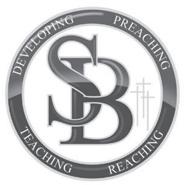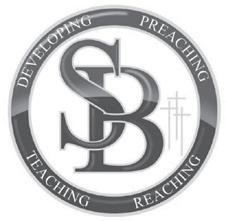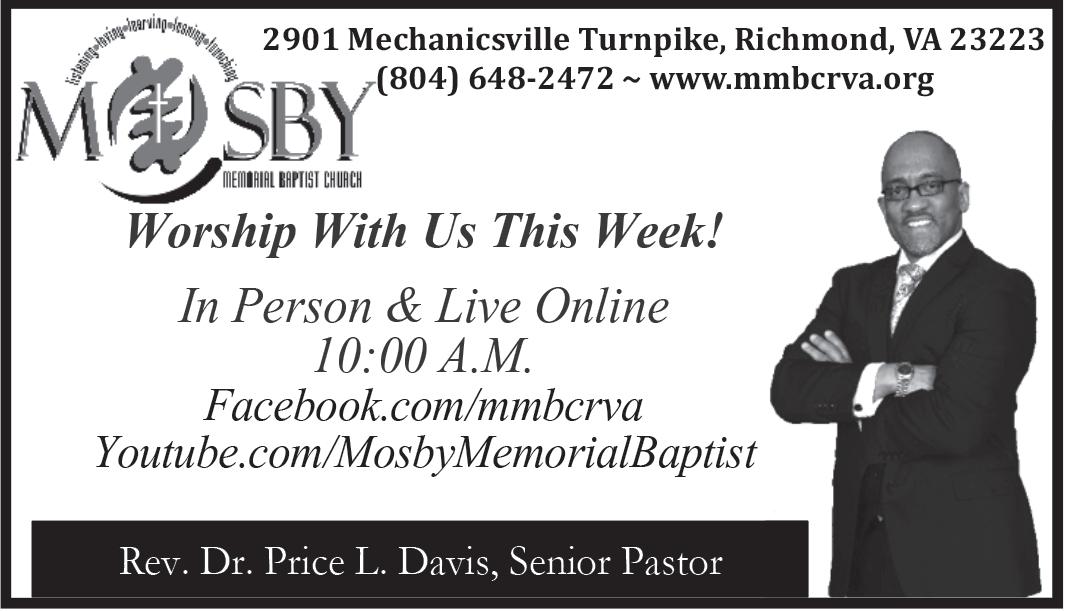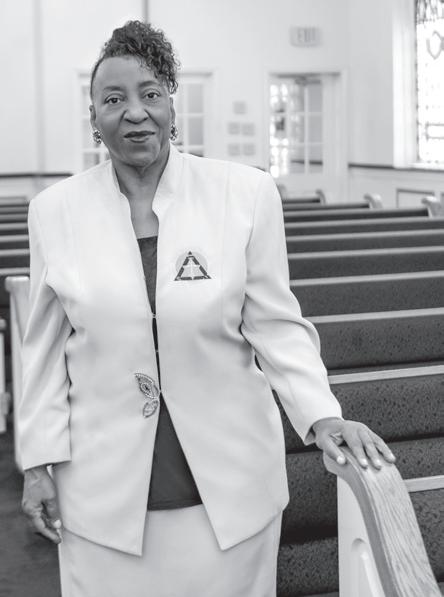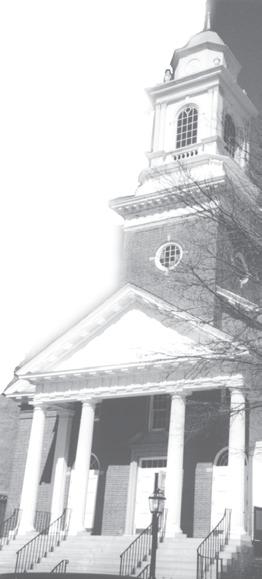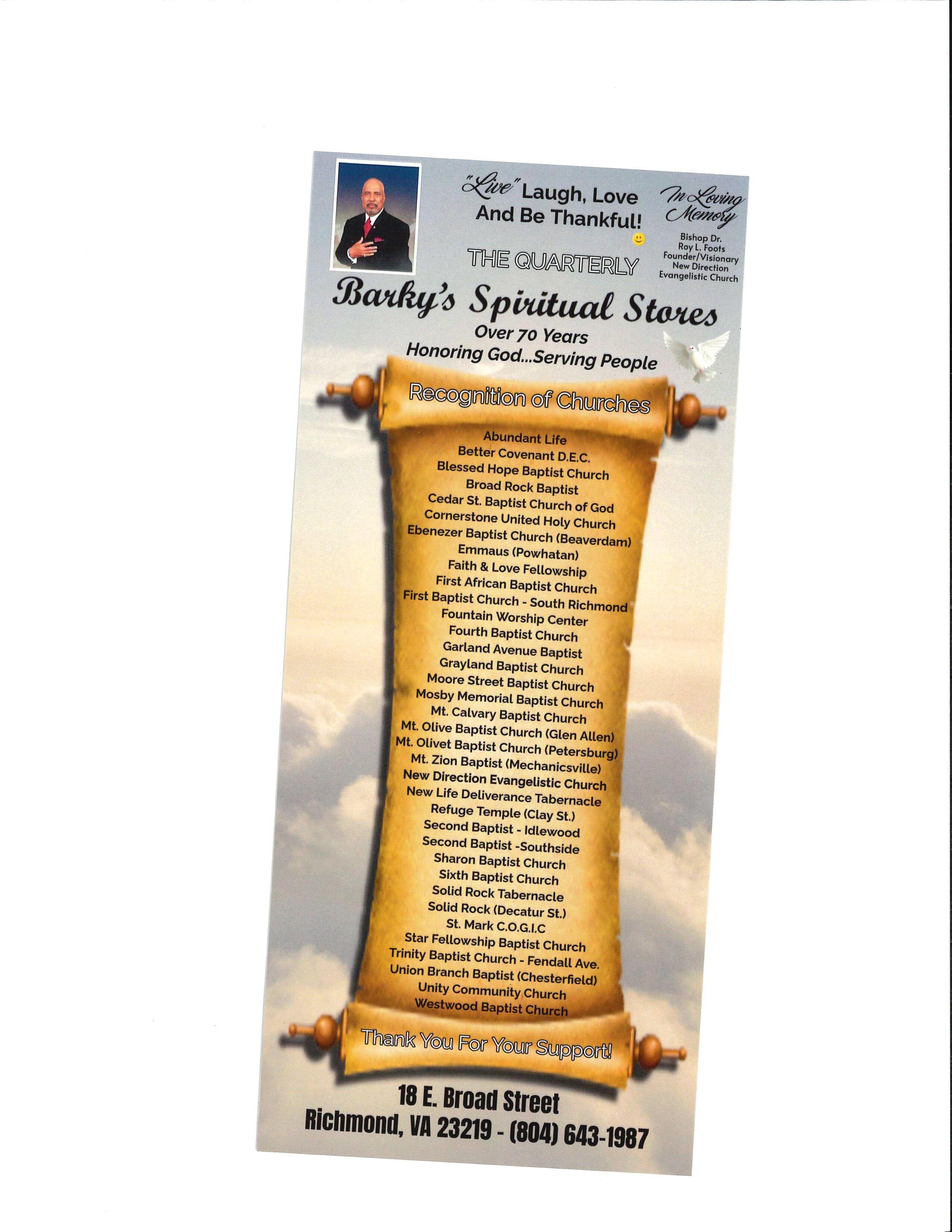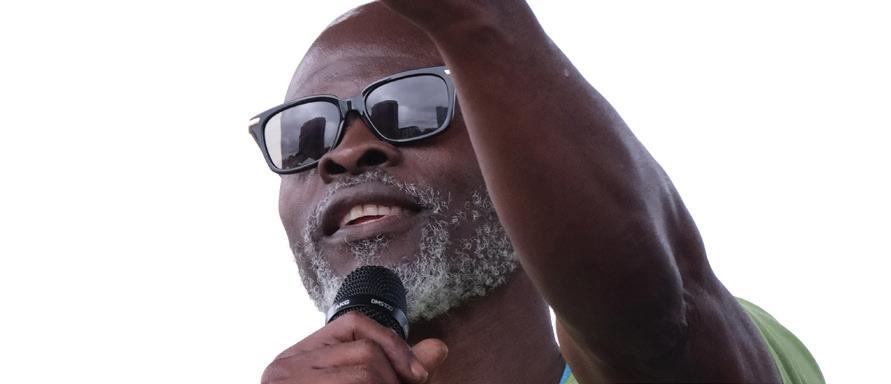
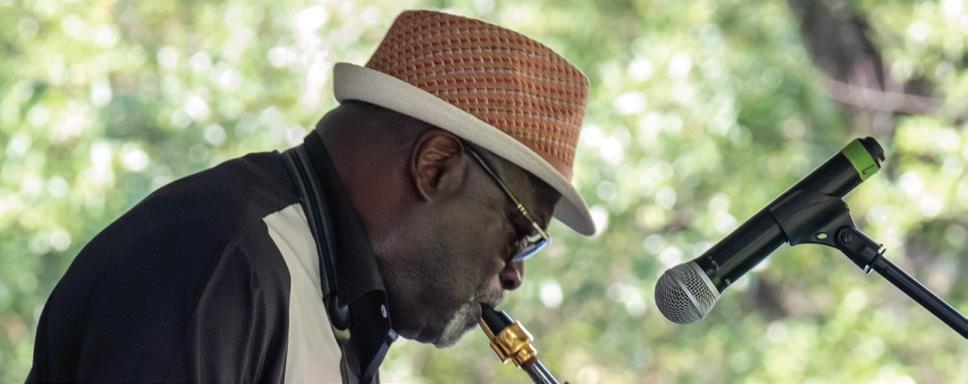



Council puts off decision on rental inspections
By George Copeland Jr.
Richmond City Council deferred a long-debated rental in-
spection ordinance Monday night after residents and housing advocates packed City Hall to call for stronger tenant protections and anti-displacement measures.
Council members voted to continue the ordinance and other housing-related items after hearing public comments from dozens of residents and advocates urging immediate action to address displacement in the city.
“Richmond, as the capital city, must lead in tenant protection,” Gilpin Informed Residents member Kiara Harris said as dozens of advocates raised signs from their seats in the council chambers. “With critical housing votes approaching, this is your opportunity to put in place proactive anti-displacement measures. Show that you are truly serious about protecting tenants in our city.” Harris and about 40 others echoed the same message an hour earlier outside City Hall during a news conference organized by the Richmond Housing Justice Collective.
Residents and advocates shared housing struggles during the conference and meeting while calling for the program’s approval, a resident-led Gilpin Court Redevelopment Plan and a stronger focus on anti-rent gouging in Richmond’s 2026 legislative agenda.
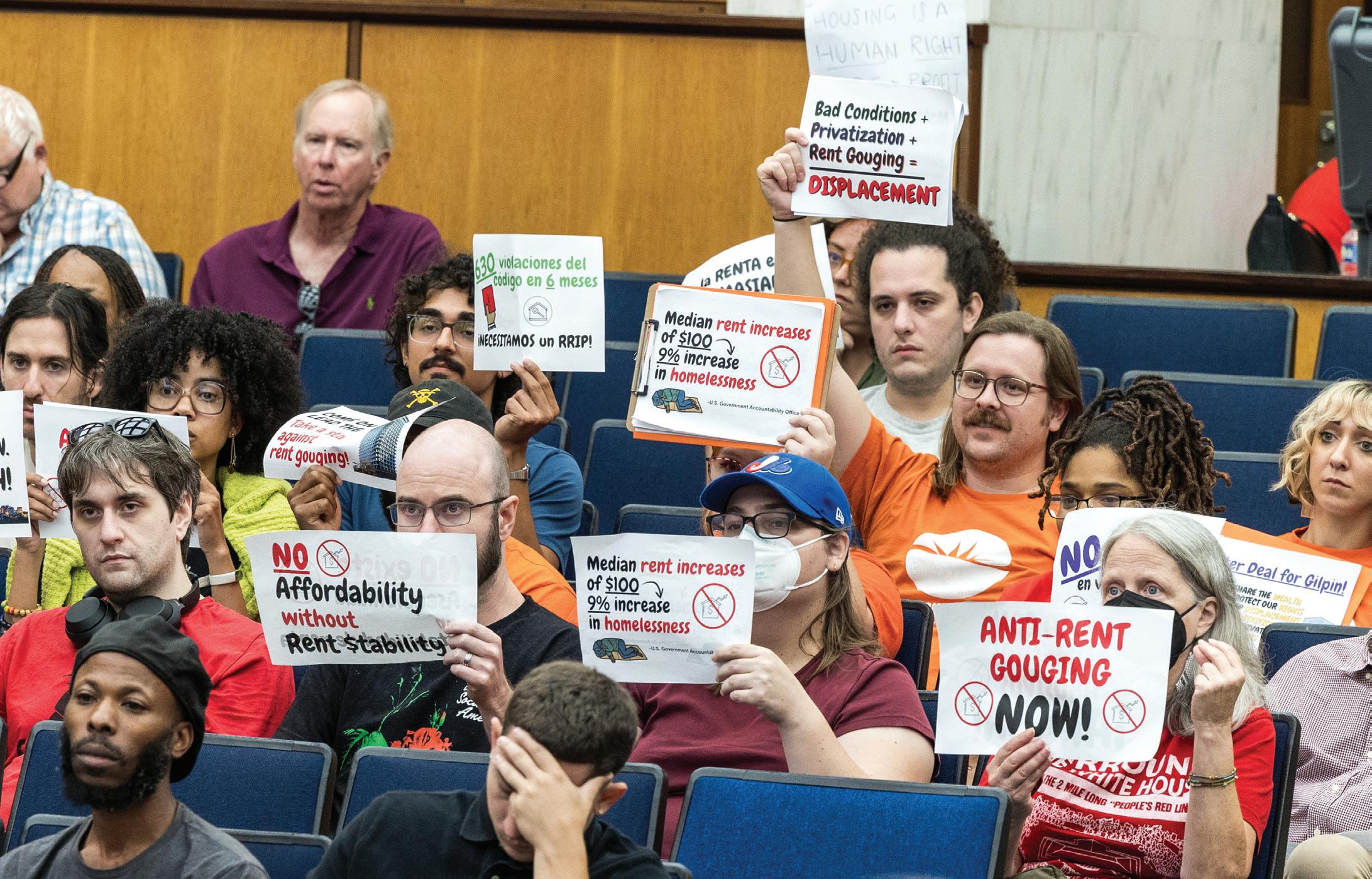
By George Copeland Jr.
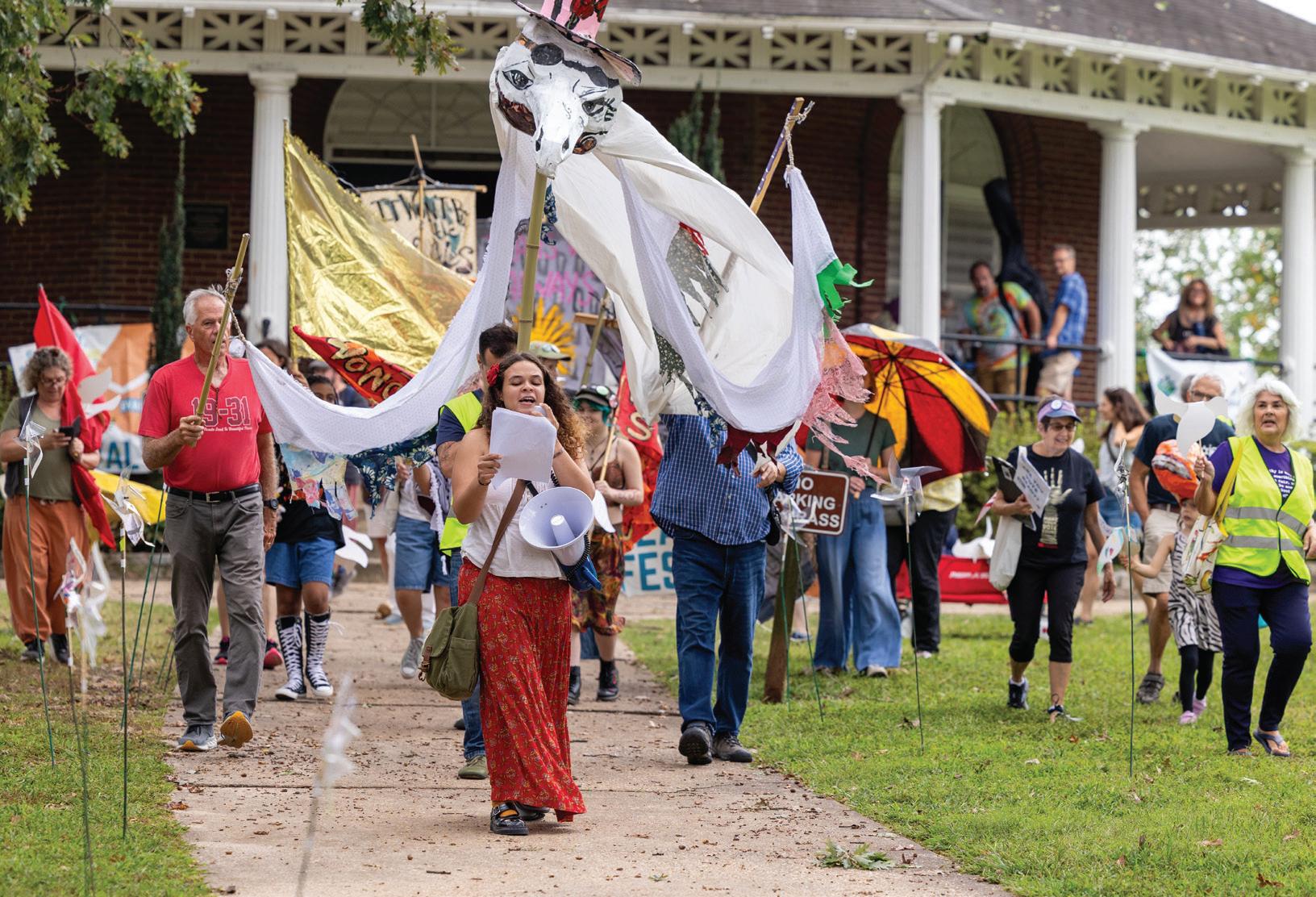
What does peace mean to you?
That question guided an afternoon of conversations, dances, songs and a march from Byrd Park to Carytown during Richmond’s 2025 Peace Festival on Sunday.
For festival founder Annette Khan, peace means mutual regard and coexistence across beliefs and backgrounds.
“It doesn’t mean you have to agree or believe everything that [others] believe,” Khan said.
“Just respect and understand.”
Mutual understanding was the spark for the festival’s creation in 2004, when children from the Islamic Center of Virginia and Bon Air United Methodist Church reunited after joining together for a candlelight vigil following 9/11. Youth from Bon Air
Please turn to A4
By George Copeland Jr.
Several changes are underway at the Richmond Office of Elections after officials discovered that 283 incorrect ballots were provided to voters in multiple districts at the start of early voting.
Director of Elections and General Registrar David Levine said Friday that ballots distributed in precincts 310, 505 and 607 were printed with the wrong candidates for the House of Delegates race. The precincts include the Gilpin area, Oregon Hill, parts of Downtown Richmond and the Virginia Commonwealth University campus.
While 278 of the ballots were mailed to voters, Levine later confirmed that five were received and submitted inperson before officials found the error and alerted the public.
“We clearly made a mistake, and it’s going to impact five voters,” Levine said Monday, adding that the office’s processes would prevent other
incorrect ballots from being scanned. “But five incorrect ballots is five more than what we want, no way around that.” The incorrect ballots were focused on races for incumbent House Dels. Rae Cousins and Betsy Carr and their challengers, Kelsey Linnehan and Richard Prado.
Levine said multiple House candidates have reached out to
Related story on A2
the office after the announcement but did not provide names. The news also raised concerns for the Richmond Branch NAACP, whose leader, James Minor, said work is underway to address the mistake after the the group received multiple calls about the incorrect ballots.
“We want to know why is this happening and how are we as a community and the registrar’s office in partnership, how are we going to correct this situation?” Minor said. “Because
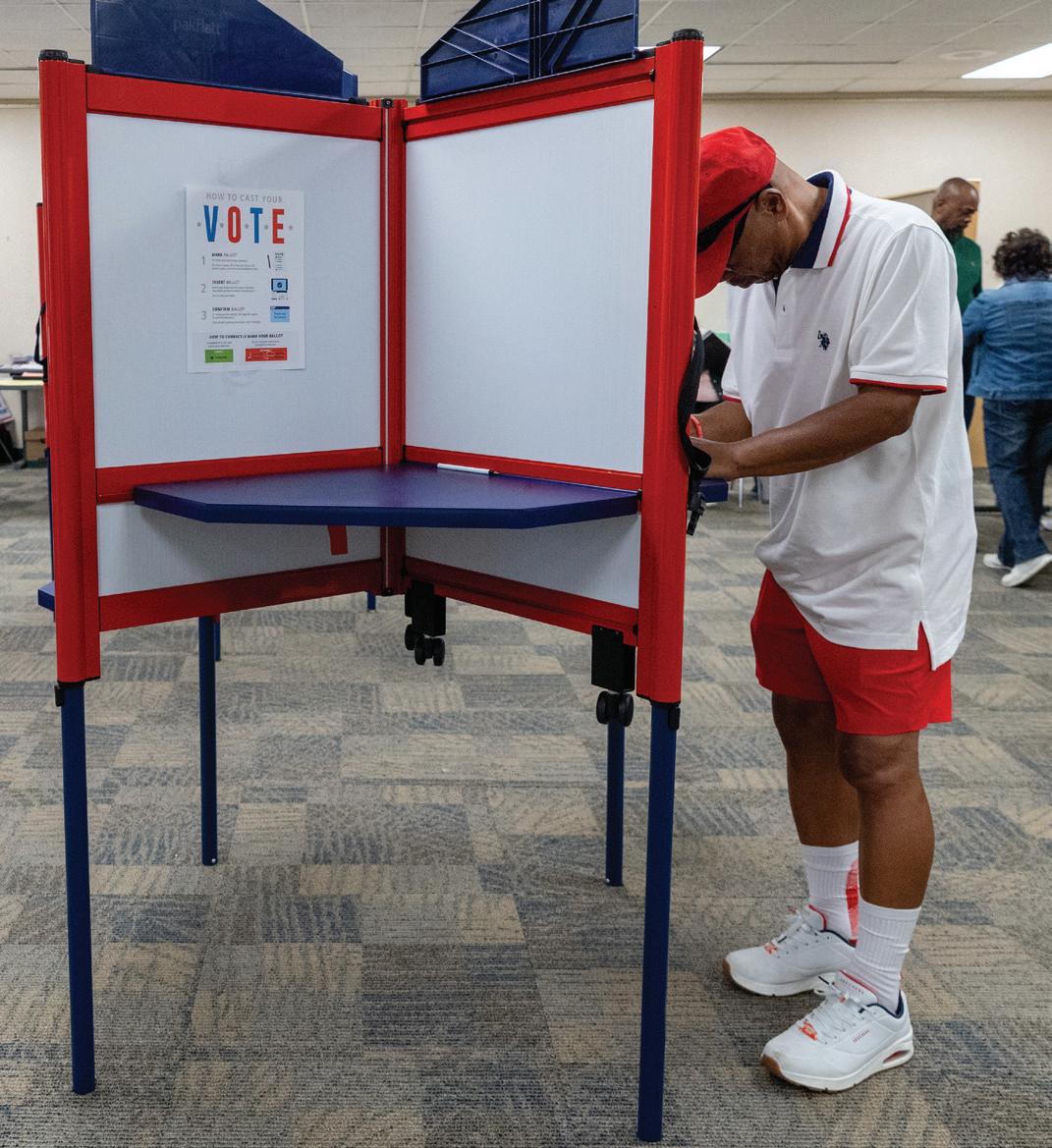
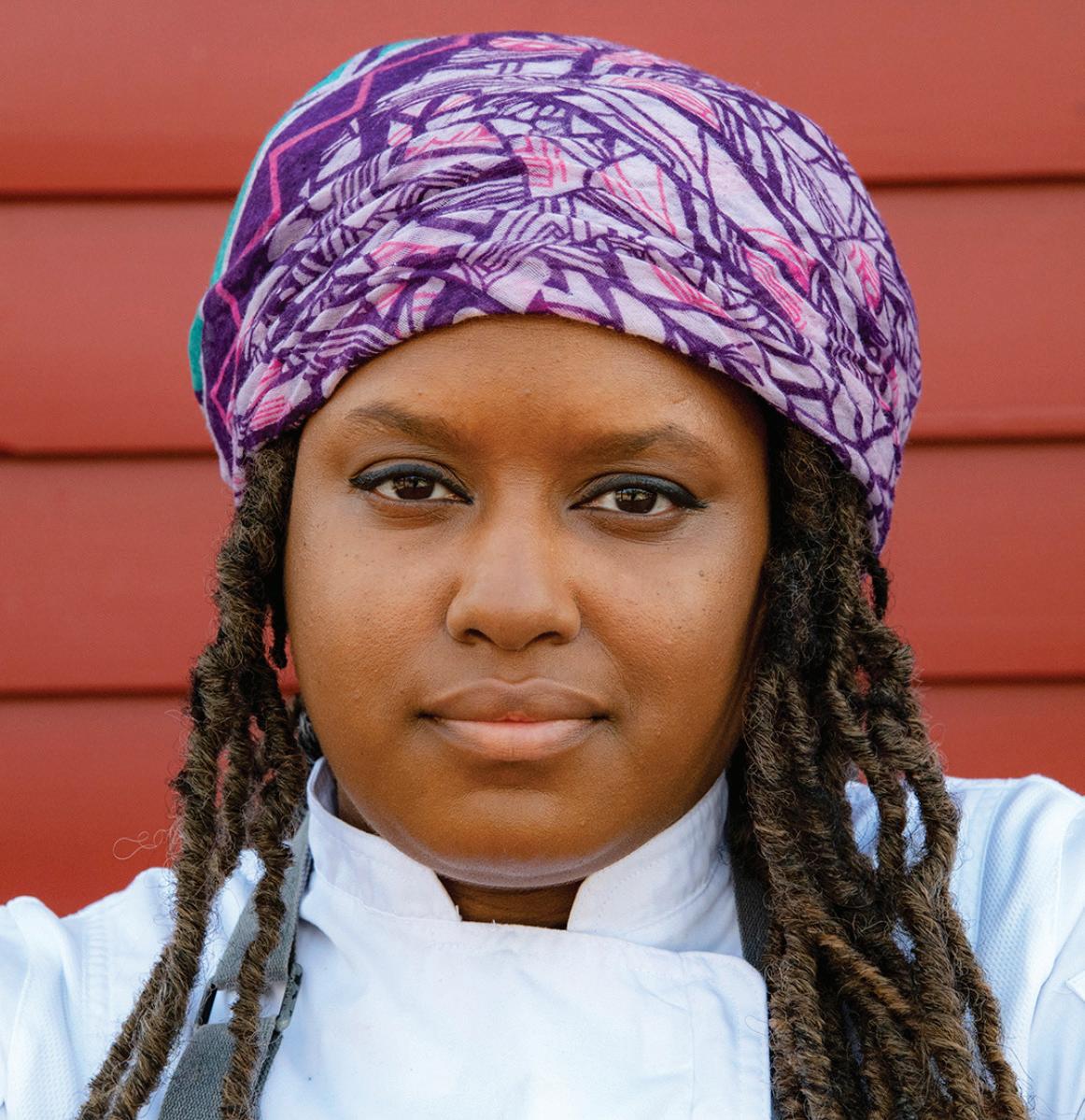
By Gabriella Lacombe
When you examine the flavors and history of food in the United States, one thing becomes clear: Large swaths of American cuisine as we know it today — particularly that of the South — are indelibly marked by the contributions of African Americans.
This month in Richmond, those contributions, the unique culinary history of Virginia and the work of contemporary Black chefs will be celebrated at The Function, a barbecue and fish fry at Shalom Farms organized by Nikki Gregory and Paul Polk of Charlotte’s Southern Deli, alongside local food writer James L. Ford III.
The Function will be held Saturday, Sept. 27 from 2 to 6 p.m. at Shalom Farms in North Side, highlighting Virginia’s culinary traditions and some of the most talented Black chefs from Richmond and beyond.
Participants include Leah Branch of The Roosevelt, Mike Lindsey of Lillie Pearl, Rabia Kamara of Ruby Scoops, Justin Ross of JC Desserts, James Beard nominees Oscar Johnson and Shenarri Freeman, Black Olive Pizzeria’s Rashad Thompson and pit master Reggie Green, as well as Gregory and Polk, among others.
“We wanted to create something where people are there to talk about the food,” Polk says. “This is an experience where no one is saying they’re running to get food real quick, they’re there to focus on coming together around food.”
“You watch tastings in shows like ‘Top Chef’ and you think, ‘Where is an event like that?’” Gregory adds. “Where everyone is dressed up, slightly buzzed, just having a good time? That’s what we’re putting together.” The day’s two focal points — barbecue and fish fry —
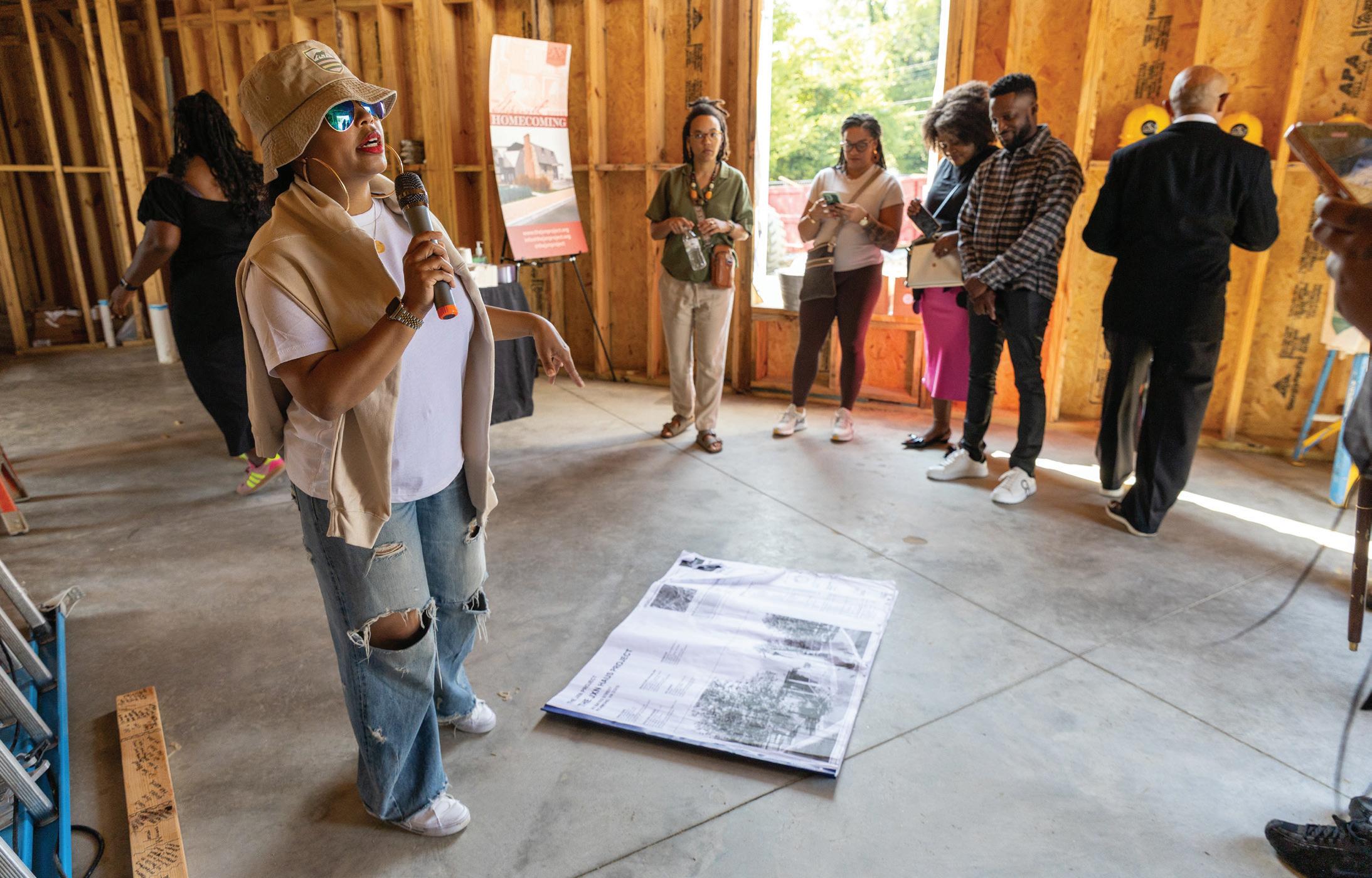
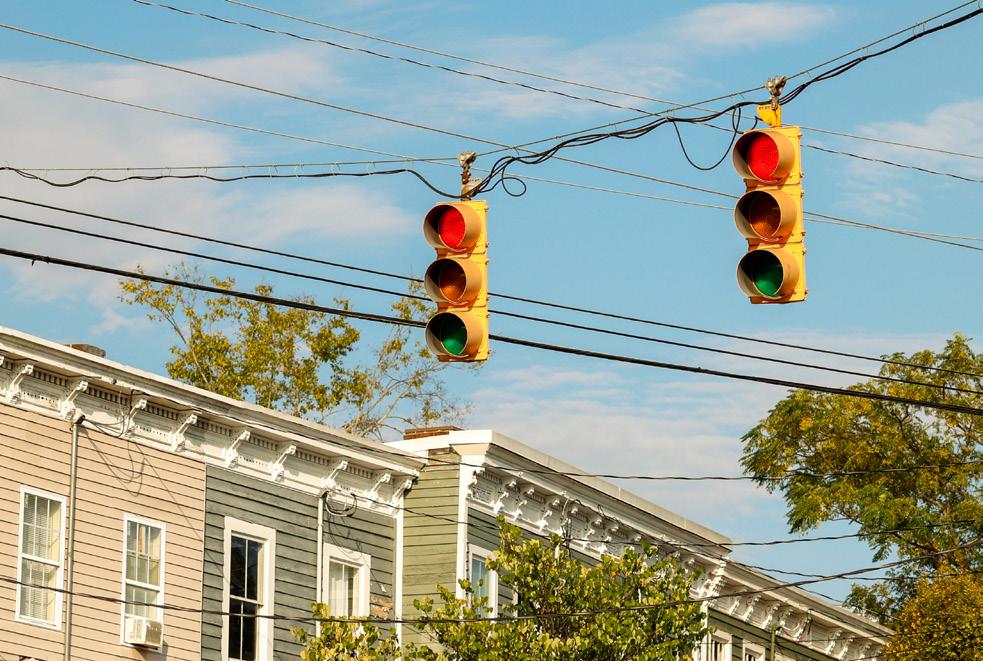
Free Press staff report
The City of Richmond is expanding its Safety Camera Program to address red light running at crash-prone intersections, with enforcement expected to begin at the end of September, weather permitting.
Chief of Police Rick Edwards said failing to stop at red lights can lead to serious injuries and fatalities.
“These cameras will hopefully reduce collisions at these intersections, leading to safer roadways for all in Richmond,” he said.
The Department of Public Works and the Richmond Police Department used crash and violation data to identify 10 pilot locations across the city’s High Injury Network. North of the James River, the locations include 25th Street and Main Street, Belvidere and Cary streets, Brookland Park Boulevard and Chamberlayne Avenue, Chamberlayne Parkway and Laburnum Avenue, and Mechanicsville Turnpike and Fairfield Way. South of the James River, cameras will be installed at Belt Boulevard and Hull Street Road, Cowardin Avenue and Hull Street, German School Road and Midlothian Turnpike, Commerce Road and Maury Street, and Hull Street Road and Warwick Road.
Construction will begin at East Main and 25th streets, then proceed to the other locations. Signage will be posted at all camera sites. Each camera will operate 24 hours a day and, after a 30day grace period, $50 citations will be issued to the registered owner of any vehicle that runs a red light, in accordance with the Code of Virginia.
According to the Insurance Institute for Highway Safety, red light running caused more than 1,000 deaths and over 100,000 injuries in 2022. Cities with similar programs have seen red light running crashes drop by up to 21%.
Officials are encouraging drivers to treat every red light as if it is monitored by a camera, not just to avoid a citation but to promote safety and support Richmond’s Vision Zero initiative, which aims to eliminate traffic fatalities and serious injuries. For more information about the city’s safety camera program, visit rva.gov.

Richmond voters are now casting ballots early for the 2025 elections, including races for governor, lieutenant governor, attorney general and members of the House of Delegates. Early voting allows residents to vote in person before Election Day and can help reduce wait times at polling places. In Richmond, early voting locations include the Office of Elections at 2134 W. Laburnum Ave., City Hall at 900 E. Broad St. and the Hickory Hill Community Center at 3000 E. Belt Blvd. Henrico County voters can visit the Western Government Center at 4305 E. Parham Road, the Eastern Government Center at 3820 Nine Mile Road or the Varina Library at 1875 New Market Road. Chesterfield County residents may use the Central Library at 7051 Lucy Corr Blvd.
Early voting runs through Friday, Nov. 1. Hours are generally Monday through Friday from 8:30 a.m. to 5 p.m., with select Saturdays also open from 9 a.m. to 5 p.m.
The deadline to register to vote in Virginia is Friday, Oct. 24. Residents can register online, by mail or in person at their local registrar’s office. Voters who prefer to vote by mail can request absentee ballots through the Virginia Department of Elections website or by contacting their local registrar. Requests must be submitted by the posted deadlines to ensure ballots are received and returned in time. Election officials encourage Virginians to take advantage of early voting to avoid long lines and ensure their participation in the democratic process. For the latest information on locations, hours, registration and deadlines, visit elections.virginia.gov.
Slices of life and scenes in Richmond
JXN Project Executive Director Sesha Joi Moon welcomed guests to the nonprofit’s dedication day Saturday, Sept. 21, at the JXN Haus and Skipwith-Roper Cottage. During the event, community members wrote well wishes on the building’s framing and contributed notes for a time capsule to be buried on the property. The JXN Project aims to contextualize the origins of the Jackson Ward neighborhood. Once a thriving center of Black economic and political life, Jackson Ward was transformed by the construction of the Richmond-Petersburg Turnpike in the 1950s, which displaced more than 1,000 families, including the last Black homeowners of the Skipwith-Roper Cottage. Research revealed that the cottage was relocated rather than destroyed, and remnants of the original structure still exist. The restored Skipwith-Roper Cottage and JXN Haus will serve as a multifunctional space for research and community programming.
By Victoria A. Ifatsuin
Richmond Public Schools is providing free vaccinations to middle and high school students for a fourth year.
“Vaccines are important because [they] help build what we call herd immunity,” said Candiece Bourne, the division’s nurse manager for school health services. “The more people that are vaccinated, the less likely we are to have an outbreak of those diseases.”
Virginia requires vaccines for all students to remain in school, unless they receive an exemption. RPS partners with the state Department of Health and the Richmond and Henrico Health Districts in allowing school nurses to administer the TDAP — which prevents tetanus, diphtheria and pertussis — and meningococcal vaccines — which
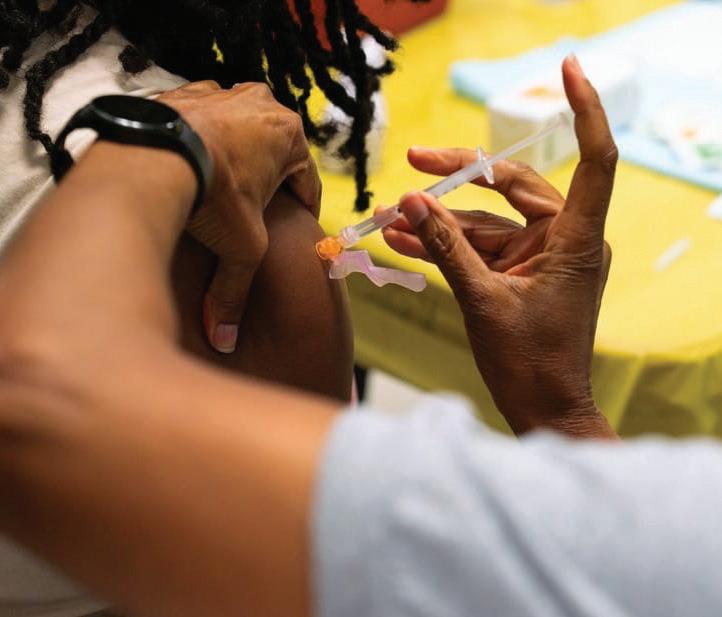
prevents meningitis.
When asked about elementary school students, Bourne said that because smaller children are in a more critical developmental
stage, their regular doctors should see them and administer the vaccines. But she also emphasized that the division’s immunization clinics are an additional support on top of the regular doctor visits all students should have.
“We provide this service as a convenience to not only our families but our students so that they’re not having to pull them out of school, make the appointment, and then get the vaccine,” she said. “They can stay in school, parents sign a consent form, giving us consent to provide it, and it’s no out-of-pocket cost to our families.”
Richmond middle and high schools are hosting the vaccine clinics into October, and the full schedule can be found at rvaschools.net.
This story originally appeared at TheRichmonder.org
Free Press staff report
More than 560 Richmond city employees were recognized Wednesday, Sept. 17, at Main Street Station for reaching service milestones with the city recently.
The second annual Service Award Ceremony honored staff marking five to 50 years of service. Special recognition for 50 years of service went to Wesley E. Fox, a utility plant specialist with the Department of Public Utilities, and Sureatha H. McGhee, a recreation program specialist with the Department of Parks and Recreation.
Richmond employs about 4,562 people; 564 reached milestone service years this year.
Tyrome Alexander, director of human resources, served as master of ceremonies. The Richmond Police Department presented the colors before remarks from Mayor Danny Avula, City Council President Cynthia Newbille and Chief Administrative Officer Odie Donald.
“Every day, your dedication turns City Hall into more than a building — it

becomes the heart of a thriving Richmond,” Avula said. “When you show up with pride and purpose, you’re not just serving residents, you’re building a city where people, families and communities can truly thrive.”
Gov. Glenn Youngkin and first lady
Suzanne Youngkin hosted senior government officials, members of the Governor’s Citizens’ Advisory Council for Furnishing and Interpreting the Executive Mansion, and the Townes family and friends for the unveiling of a commissioned portrait of longtime butler Martin “Tutti” Townes.
The governor praised Townes as a beloved figure in Virginia’s public service.
“From greeting world leaders to caring for first families, Tutti has touched countless lives with humility and respect,” he said. “His portrait will remind future generations that true service is measured in hard work, loyalty and faithfulness.”
Townes, joined by his wife, Stephanie, and their five children — Martin, Michael, Cherry, LaTamara and Sheyenne — saw the portrait painted by Richmond artist Stanley Rayfield and received a gubernatorial proclamation establishing Sept. 17 as Martin “Tutti” Townes Day. Commissioned by the advisory council as a gift to the historic home, the painting honors his four decades of service, beginning in 1984 under Gov. Charles Robb and continuing through 11 consecutive governors.
Newbille, speaking on “The Power of Service,” said, “Service is the quiet force that holds organizations, communities and even nations together. It may not always make headlines, but it shapes lives every single day.”
City officials said the awards underscore Richmond’s commitment to recognizing employee contributions and advancing the mayor’s priorities for thriving neighborhoods, inclusive communities and a sustainable future.

“Tutti Townes has been a leading ambassador for the Executive Mansion for 40 years,” Suzanne Youngkin said. “His professionalism, loyalty and genuine kindness have helped guests feel welcome and are central to the inner workings of the home. Today, we honor not only his service but the legacy of hospitality he and his family have given to Virginia.”
Throughout his career, Townes welcomed dignitaries from around the world, including Queen Elizabeth II, Bishop Desmond Tutu, Charlton Heston, Garth Brooks and
Sinbad. His family’s legacy of service at the mansion spans generations, including his late mother, Doris Townes Fleming, his brothers Theodore and Marvin, his wife and two of his children, Martin and Cherry. In 2022, the state named one of the buildings across Governor’s Street from the mansion after the Townes family. The portrait is part of the first lady’s efforts to use art to tell Virginia’s diverse stories, according to a news release. It will hang alongside more than 70 other works from artists, museums and historical societies.
THREE STAGES OF GREAT MUSIC, ARTS, FOOD AND FUN! JACKSON WARD NEIGHBORHOOD
STAGE SCHEDULE 2025

SATURDAY, OCTOBER 4
WAVERLY R. CRAWLEY MAIN STAGE 1st and Marshall Streets
11:40 - 11:48am Miliani Hopkins – “Lift Every Voice and Sing” & “Oh Happy Day”
11:50 - 12:40pm Brother Blues Band
1:00 - 1:30pm Richmond Urban Dance
1:50 - 2:50pm Mike Gayles Band
3:15 - 3:50pm Kemel Line Dance King of RVA
4:20 - 5:20pm Art of Noise RVA
5:50 - 7:00pm The Chuck Brown Band
JOE KENNEDY JR. JAZZ STAGE
Clay and 3rd Streets
12:00 - 1:00pm Mike Hoggard, Harry Wilson & Friends
1:30 - 2:30pm Fabian Lance Band
3:00 - 4:15pm Melinda Ford Quartet
4:45 - 6:00pm Nathan Mitchell & Mo’Horns
EGGLESTON HOTEL COMMUNITY STAGE 2nd and Leigh Streets
12:00 - 12:40pm Drums No Guns
1:00 - 1:40pm Alexander Mack
2:10 - 2:40pm Ezibu Muntu
3:00 - 3:50pm DJ Milk D
4:00 - 5:00pm Line Dancing with Rhonda
Festival Weekend
SUNDAY, OCTOBER 5
4:00 - 4:50pm Rick Elliott Subject to change
Official Festival Poster Artist, Amiri Richardson-Keys
WAVERLY R. CRAWLEY MAIN STAGE 1st and Marshall Streets
1:00 - 1:30pm Black Awakening Choir at VCU
2:00 - 2:30pm GMWA Goochland VA & Vicinity
3:00 - 3:50pm Klaxton Brown
4:15 - 4:40pm Style to Empower with Dr. Bert –spoken word
5:00 - 6:00pm DJ Drake & MC Choco
JOE KENNEDY JR. JAZZ STAGE
Clay and 3rd Streets
1:00 - 1:45pm Richard D’Breau / Jazz in the Spirit
2:15 - 3:00pm The Few
3:30 - 4:30pm RJS presents Trin ft. The Nucleus Trio & Nathan Fussel
5:00 - 6:00pm The Happy Band Tribute to Debo Dabney
EGGLESTON HOTEL COMMUNITY STAGE
2nd and Leigh Streets
1:25 - 1:45pm Style to Empower with Dr. Bert –spoken word
2:00 - 2:30pm 40+ Double Dutch Club –Richmond, VA Subclub
2:33 - 2:40pm Renaissance Roll Call – Gary Flowers
2:50 - 3:40pm Gene Pendleton & Friends
The 2025 official poster was commissioned to Amiri Richardson-Keys. Posters and tshirts for sale at the Venture Richmond tent on 2nd Street at the festival.
Radio One “2nd Street MIX” Weekend
Tune into 99.3/105.7 KISS FM on Saturday, October 4 from 4:00pm-midnight and Sunday, October 5 from noon-7:00pm. Hear mixes from DJ King Tutt, DJ Drake, and DJ Lonnie B playing all your favorite 2nd Street Festival hits!
FREE Walking Tours, guided by Gary Flowers
FREE guided walking tours meet at the Maggie Walker National Historic Site, 2nd & E. Leigh Street, and leave at 3:00pm on Saturday and at 3:00pm on Sunday. Kidz Zone
The Children’s Museum and Black History Museum and Cultural Center of Virginia are planning fun activities. Join BHMVA for “Dancing the Duce,” a fun kids’ activity that takes families on a stamp-collecting journey Balloon twisting is provided by Balloons By Extreme. The Kidz Zone is in the parking lot between Clay and Leigh Street of 2nd Street.






The inspection program ordinance has faced multiple discussions and delays since its introduction in June, years after the City Council first asked then-Mayor Levar Stoney’s administration to develop a program addressing housing maintenance and safety issues.
The ordinance was sent to the council last week by the Land Use, Housing and Transportation Committee with a recommendation to amend and revise the proposed program.
Despite the ordinance’s delay, advocates remain undeterred and plan to keep pressing city leaders to approve the inspection program while continuing broader efforts to improve living conditions.
“We know that [Richmond] has challenges and still, what it chooses to prioritize is going to speak loudly throughout the whole Commonwealth,” resident and Legal Aid Justice Center community organizer Gustavo Espinosa said after the meeting. “It’s important beyond just what the city needs.”
The rental inspection ordinance will be discussed during the council meeting Tuesday, Oct. 14.
Council members also approved two housing development projects during Monday’s meeting, including a special permit for Virginia Union University’s Gateway North housing project at Brook Road and Lombardy Street. The mixed-use housing project is the initial step in VUU’s multimillion-dollar plan to build housing around its campus.
“At a time when housing is out of reach for too many people across the country, Virginia Union and the City of Richmond are taking action here in our hometown,” VUU President and CEO Hakim J. Lucas said in a statement Tuesday. “We are grateful to
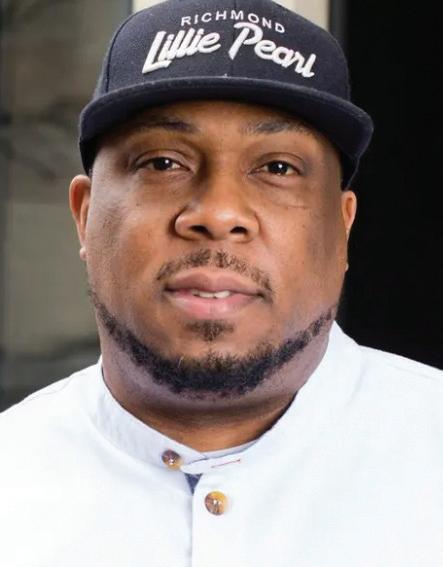
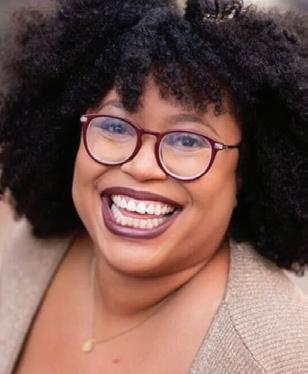
stem from African American foodways and culinary traditions dating back hundreds of years.
The Function will be taking over Shalom Farms — a regular host of the RVA Black Farmers Market — and will also include music, games, a vegetable-focused cooking demonstration from Jason Muckle and a live talk on African American foodways and the history of barbecue by food anthropologist and writer Debra Freeman, who argues that the first U.S. barbecue originated right here in Virginia.
In addition to whole-hog barbecue, attendees can expect dishes like lion’s mane mushroom pie, a grazing board with pickled seafood and hog’s feet, watermelon donuts and more.
The event reflects each of the three founders’ lifelong passions for food, shaped by culinary upbringings that were both distinct and overlapping.
Ford, a native of Smithfield, says his family was “big into both seafood and pigs” (his cousins will provide The Function’s whole hog) and that he started cooking at a young age under the tutelage of his two grandmothers.
Polk, whose father was a longtime waterman, says seafood was so common that getting blue crab on an average Tuesday was routine; dried and salt fish were staples, and his grandmother was a prolific canner.
“This was created out of a want to celebrate everything that we’re eating and what it represents,” Ford says.
Gregory, whose father was an executive chef and whose grandfather’s West Virginia roots brought an Appalachian influence, says she treasures family recipes and culinary heirlooms, including a recipe for apple butter, her grandmother’s copper kettle and a mixing paddle that belonged to her great-great-grandfather.
“I’m really looking forward to the fellowship,” Gregory says. “We’re looking forward to the community that’s going to come from this.”
The Function takes place Saturday, Sept. 27 at Shalom Farms, 1311 Westwood Ave.
This story originally appeared at StyleWeekly.com.






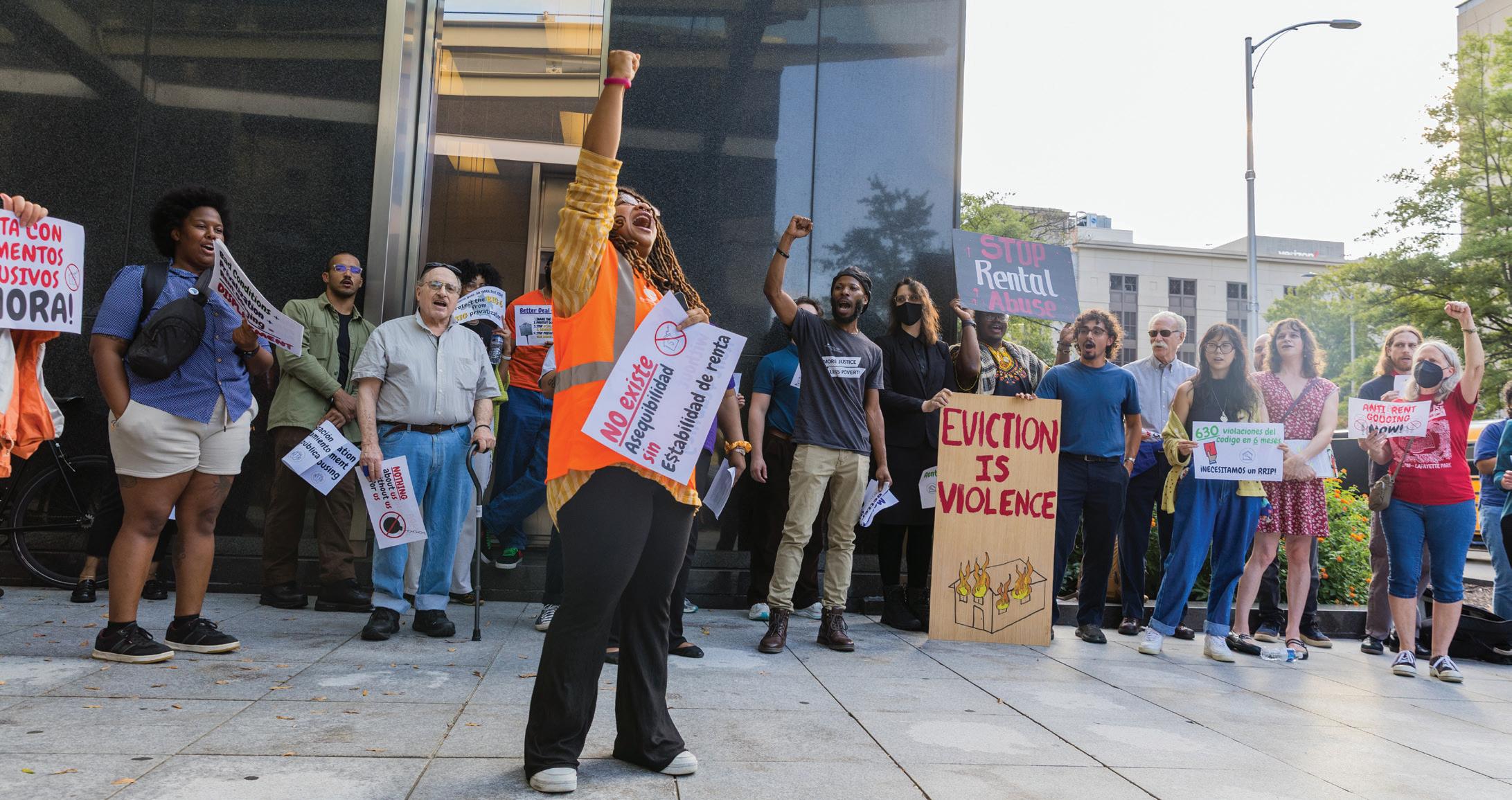
the city for their partnership on this important project.”
Two ordinances focused on changing or maintaining Rich-
current real estate tax rate were continued to Oct. 14
organized skits and other activities with the Islamic Center, which grew into an annual event.
The festival ended in 2017 due to funding challenges but returned in 2023 with a smaller gathering hosted by the Richmond Peace Education Center (RPEC), one of the original sponsors. RPEC has since continued to organize the festival.
PeaceFest 2025 partnered with Third Act RVA, RVA Indivisible and other groups to host “A Day for Peace and the Planet,” which also marked the International Day of Peace and Sun Day, an event promoting clean energy.
Richmond neighbors Chelse Williams and Jamaar Khan said they saw peace as a goal achieved through open minds and
care for community and the world.
“Supporting the people I love and care about,” Williams said. “Taking care of the Earth, of course, I continue doing my eco-friendly lifestyle as well.”
About 40 PeaceFest attendees joined the Sun Day event on Cary Street after marching from Byrd Park. Speakers and partners there linked fossil fuels to global conflict and environmental damage, saying renewable energy can benefit both the planet and public.
“Climate change has a lot to do with a lot of issues and violence,” said Richard Walker of the criminal, health and environmental justice group Bridging the Gap in Virginia, which was offering solar panel installation training opportunities during the event. “I think renewable energy will help change a lot of that.”
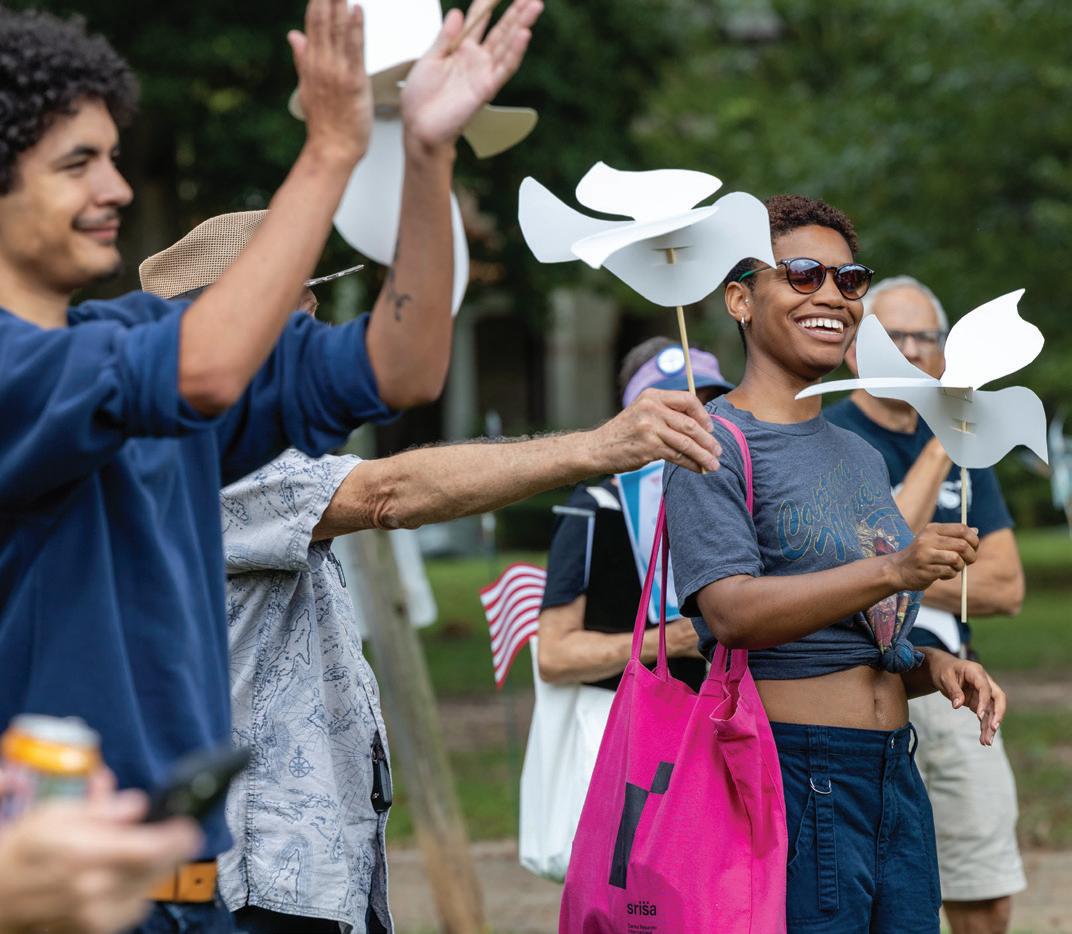
Later, a panel of local community members, educators and activists gathered behind the AlterNatives clothing store to discuss building a better world. Panelists’ answers to the opening question — what peace means — were shaped by their experiences opposing political violence, war and exploitation.
“Peace is not merely the absence of violence,” Palestinian activist Sereen Haddad said. “But more so the presence of dignity, and of justice and of freedom in general.” Throughout PeaceFest, speakers and attendees stressed that peace cannot be gained passively.
“What are we doing for peace?” RPEC member Nichole McVeigh asked during the Sun Day event, inviting the crowd to attend the panel. “Because peace is not peace unless it’s action.”
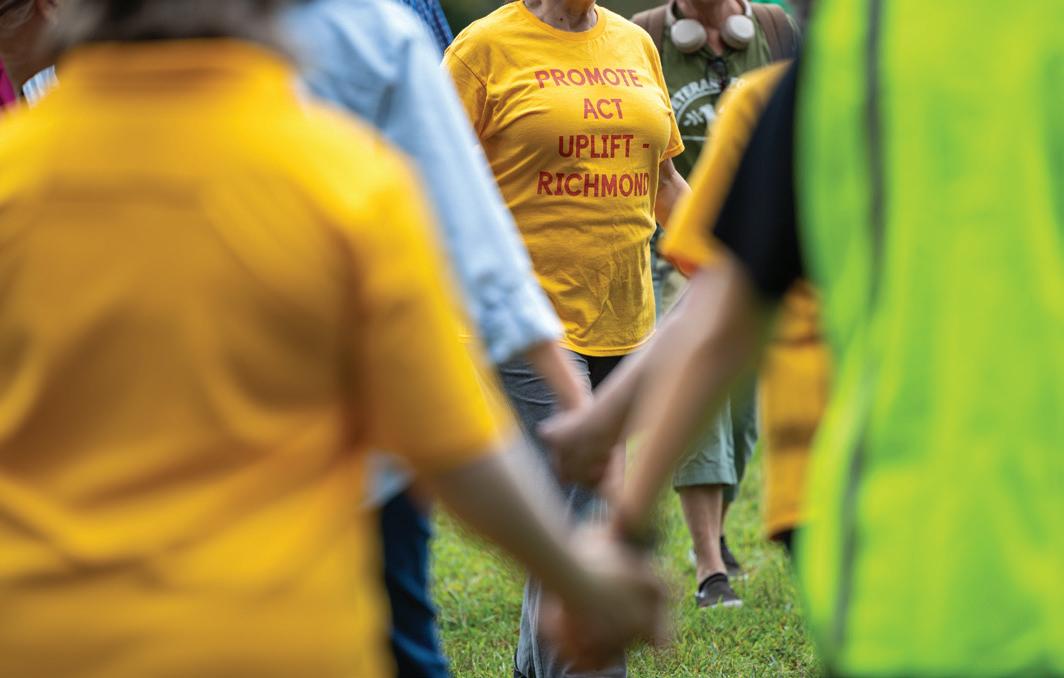
we cannot afford to give folks the wrong ballots. We just can’t afford to do that.”
This is not the first time the Registrar’s Office has faced ballot problems during an election season. Last November, 11 residents voting in person at the Calhoun Community Center on Election Day re-
ceived incorrect ballots for federal races, leading to the firing of a poll official. Similar issues occurred during the 2022 election.
The Office of Elections is reviewing its proofing, printing and verification processes to find the source of the error, Levine said, with additional checks, staff training and oversight planned for implementation. New ballots will be sent to voters in the affected precincts, who can choose to wait for them in the mail or cast a provisional ballot at the Office of Elections. Any incorrect ballots already returned by mail will be set aside in a secure location, and corrected ballots will be sent to those voters. Voters with questions can email voter@ rva.gov, visit.rva.gov/elections or call

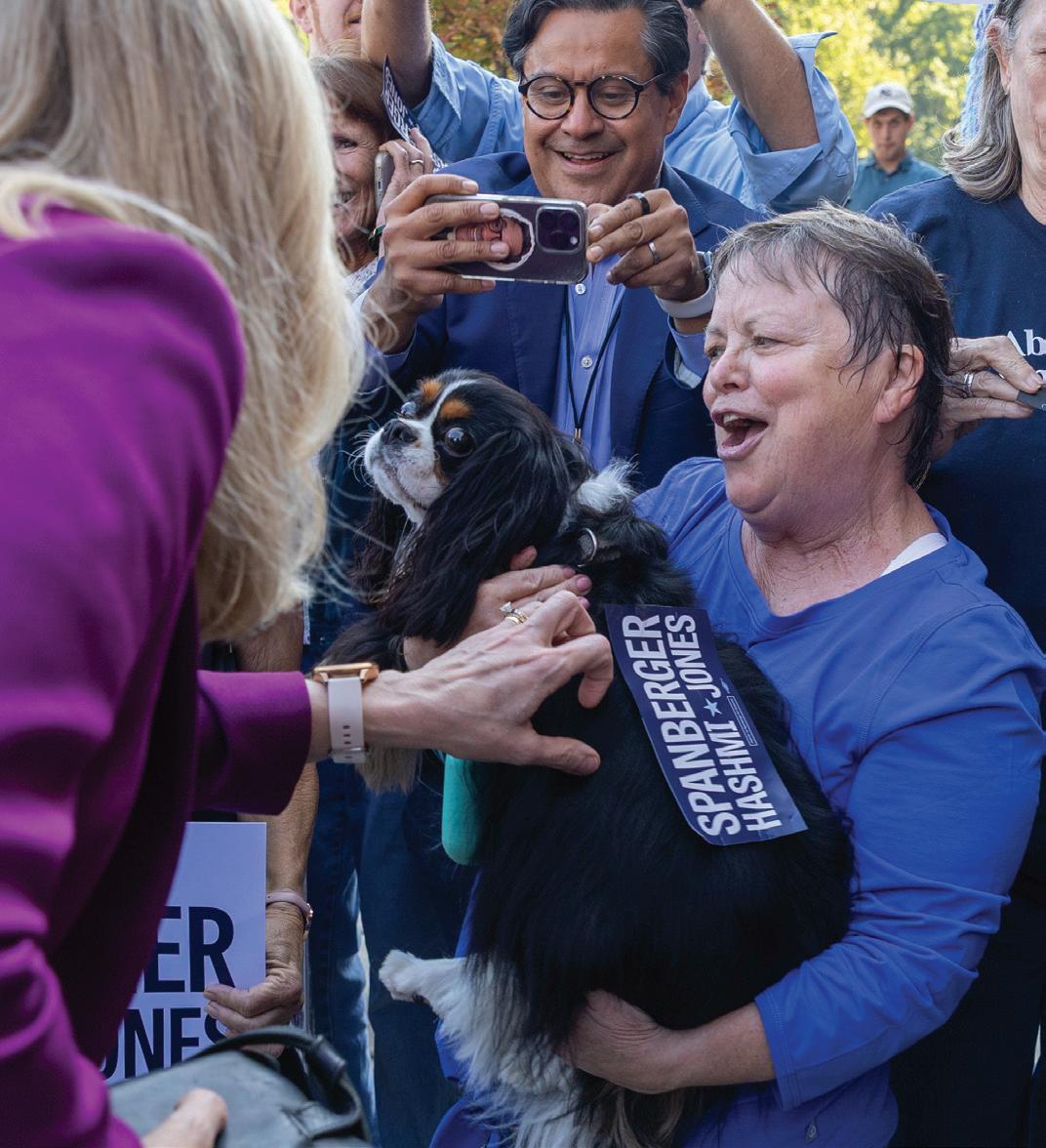
By Bilan Osman VCU Capital News Service
Budget cuts to the Supple-
mental Nutrition Assistance Program and food banks will put more strain on Virginia organizations already struggling to meet increased need and costs, food bank representatives say.
President Donald Trump signed the One Big, Beautiful Bill Act that will cut an estimated $187 billion from SNAP and change eligibility requirements. Critics say this will offset tax relief for the wealthy, while the administration says it is to motivate the program to run more efficiently.
Virginia will spend more to provide 874,000 people with SNAP benefits. The funding cuts are determined by three factors, such as a state’s error rate, federal administrative support and new SNAP work requirements, according to the Council of State Governments Midwest.
The new cost-share requirements could put an additional expense of about $352 million on Virginia’s biennial budget, according to earlier estimates from the nonpartisan Center on Budget and Policy Priorities.
Factors in funding cuts
A state’s error rate includes overpayment or underpayment to SNAP recipients. Virginia’s recent error rate is 11.5%.
Gov. Glenn Youngkin issued an executive directive to lower the state’s error rate. If it is not reduced, the state will have to cover 15% of cost share for SNAP.
Major impacts are set to take place on Oct. 1, 2026, when the bill goes into effect in the state, according to the Virginia Department of Social Services.
The state will be responsible for 75% of the administrative cost while the government is responsible for 25%. Previously, the administrative cost share was 50% for the state and federal governments.
There are also new eligibility and work requirements for
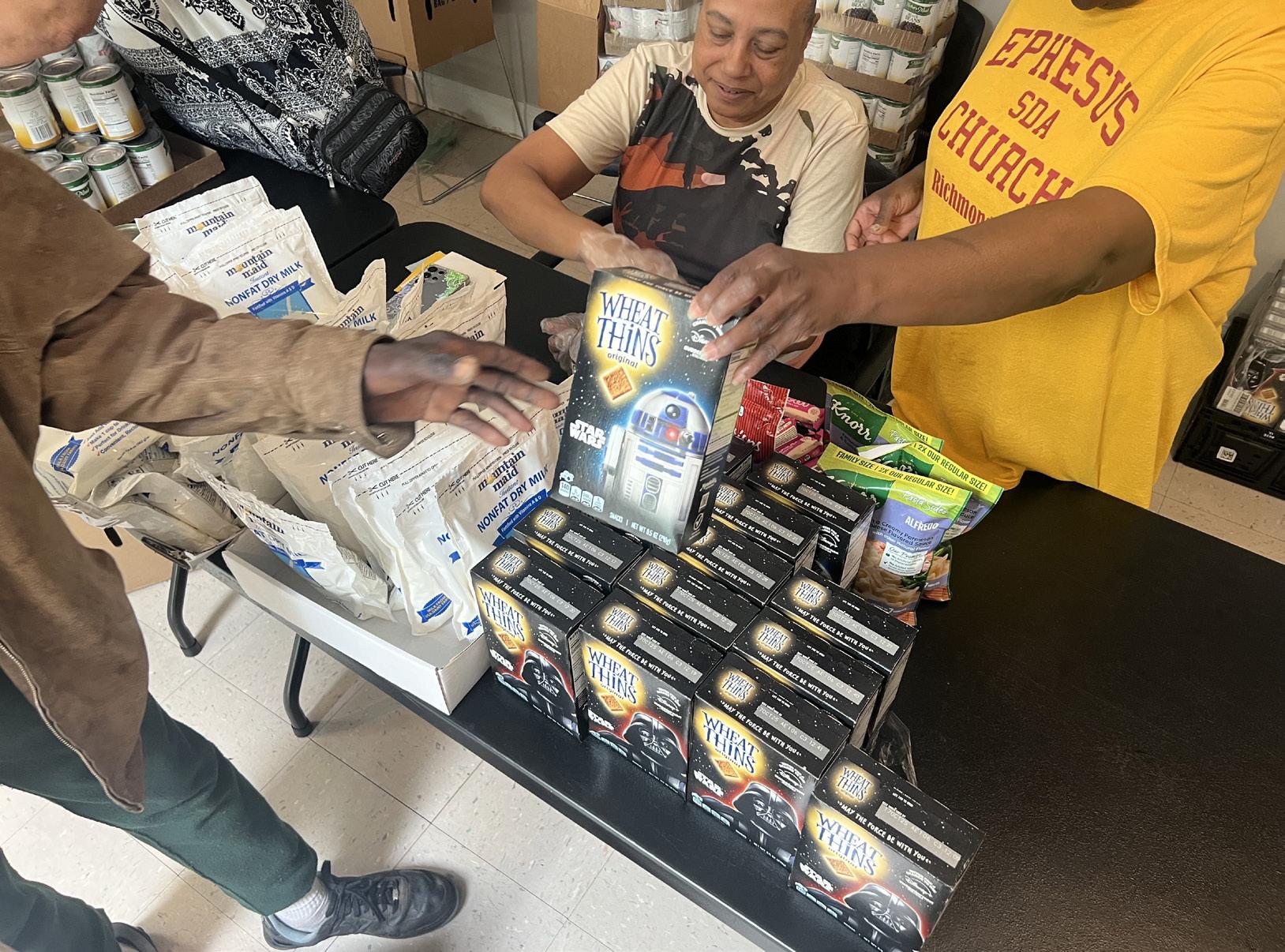
SNAP recipients, who must recertify each year:
Working age requirements for adults were extended to 65; it was previously 55.
Parents with children 14 and older are now required to work; they have been generally exempt.
Veterans, individuals facing homelessness and some individuals in foster care are required to work.
Recipients must either train, volunteer or work a minimum of 80 hours a month to qualify.
An estimated 2.4 million people will not qualify for SNAP in a typical month because of these new provisions, according to the Congressional Budget Office. The bill’s tax cuts run through 2034.
Families with children make up 67% of Virginia’s SNAP recipients as of 2024, according to data by Center on Budget and Policy Priorities. More than 80% of the families who receive SNAP have been employed in the past year.
The bill also puts a restriction on the Thrifty Food Plan
developed by the U.S. Department of Agriculture. The plan accounts for food price inflation to determine how much SNAP benefits families should receive.
it; every time I recertify, it’s something different.”
The price of food increased by 2.9% from July 2024 to July 2025, according to the USDA.
Brown-Akherraz cannot afford increased rent and the cost of eating healthy. Now, she worries about qualifying
Those increased costs have put almost half of the state’s residents in debt, according to a poll by No Kid Hungry Virginia.
The USDA also slashed an estimated $1 billion in funds for food banks and schools, separate from the bill, according to CBS News.
Food banks see increased need
Mary Brown-Akherraz, 63, is on a fixed income and uses the pantry at Ephesus Seventh-Day Adventist Church in Richmond. She stopped working 17 years ago due to back and hip issues and is in treatment for breast cancer. She is worried by an inconsistency of SNAP benefits.
“It went from $200 down to $79, then it went up to $104, then it went down,” BrownAkherraz said. “I don’t get

for SNAP in the future.
“If it wasn’t a place like this, half of us wouldn’t even survive,” Brown-Akherraz said.
The pantry has seen an increased demand for food assistance, according to Edwayne Robinson, director of community services at the church.
The pantry serves an older adult population worried about Social Security and SNAP benefits decreasing or being cut completely, according to Robinson.
Eddie Oliver is executive director of the Federation of Virginia Food Banks, a collaborative organization between the seven regional food banks and over 1,100 agency partners.
SNAP eligibility changes add administrative burdens and make filing timely paperwork more challenging, Oliver said.
“It often presents an obstacle for working families who need the assistance,” he said. “Many of the SNAP beneficiaries who can work do work, and the vast majority of people who benefit from the program are children, seniors or disabled.”
Food insecurity in rural areas
Over 1 million Virginians for the first time in history are
food insecure. Eight in 10 of the localities with the highest rates of food insecurity are in rural areas, Oliver said. Rural communities are bracing for the impact of the federal cuts, said Karen Ratzlaff, chief philanthropy officer of Blue Ridge Area Food Bank, which provides food for people in 25 counties and eight cities across western and central Virginia.
The food bank will receive a couple of million pounds less in food from the federal government this fiscal year. A quarter of the food it distributes comes from the government. A large portion also comes from manufacturers and growers, Ratzlaff said.
Blue Ridge has experienced a 16% increase in the amount of people served in the past year, Ratzlaff said. The demand is currently 45% higher than at the height of the pandemic. The food bank has financial reserves it is budgeting to brace for these impacts. “But increasingly we are buying more and more food and, this last year, we purchased about $5 million worth of food for distribution,” Ratzlaff said.
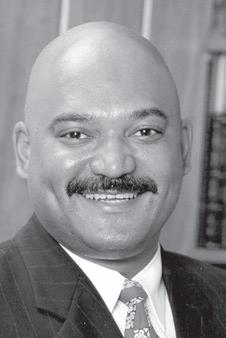
Do
would like to ask you to donate BLOOD to help sickle cell patients who need regular transfusions.
They need specific blood types that match their own to minimize the risks of repeated transfusions.
African American blood donations are best for these patients.

make an appointment to donate.
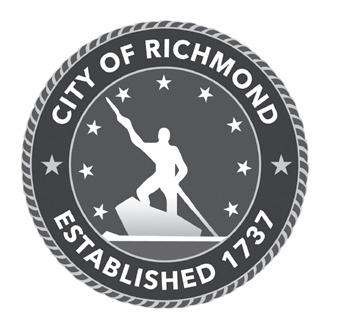

Richmond Highway Improvements, Hull St to Albany Ave State Project: U000-127-118, UPC 118944
Federal Project: STP-5B27(038)
Tuesday, October 7, 2025
Open House: 5:00 PM to 7:00 PM
Blackwell Community Center – 300 E 15th Street, Richmond, VA 23224
The City of Richmond will hold a Public Hearing for the Richmond Highway Improvements Project. The project is along Richmond Highway from Hull Street to Albany Ave, and includes improvements to Maury Street, Stockton Street, and Decatur Street at Richmond Highway. The project will provide dedicated left-turn lanes on Decatur Street and Maury Street, modernized traffic signals at Maury Street, Stockton Street, and Decatur Street and pedestrian infrastructure including median refuges, bump-outs, pedestrian signals and countdown timers. It will also aim to improve safety via conflict point reduction through entrance closures/consolidations and provide safer and more accessible sidewalks.
Review the proposed project plans depicting the major design features and the National Environmental Policy Act (NEPA) documentation at the Informal Plan Review. The current version of the environmental document will be available for review and comment at the Public Hearing.
Project materials will be available at the public hearing, and can be made available upon request to be viewed in person at another time during the comment period. Give your written or oral comments at the hearing or submit written comments postmarked by October 22, 2025 to Winston Phillips, City of Richmond Public Works, 900 East Broad Street, Richmond, VA 23219 or winston.phillips@rva.gov.
The City of Richmond ensures non-discrimination and equal employment in all programs and activities in accordance with Title VI and Title VII of the Civil Rights Act of 1964. No person shall be excluded from participation in or be denied the benefits of, or be subjected to, discrimination under any program or activity receiving Federal financial assistance.
If you feel you have been denied participation in, or denied benefits of, or been subjected to discrimination, in regard to this project or otherwise discriminated against because of your race, color, national origin, gender, age or disability, you may contact the City of Richmond’s citizen request center at 311.
Questions regarding this project should be directed to Winston Phillips at 804-646-6430 or winston.phillips@rva.gov. Any persons with questions on the accessibility of the facility or need for reasonable accommodations should contact Winston Phillips.
One advantage of spreading the voting process over several weeks, rather than cramming all the tabulation into a single day, is that it allows time to catch and correct mistakes on the ballots.
After a day of early voting, we’ve already seen an example of the kinds of errors that can happen. Last Friday, some residents showed up to cast their ballots only to discover they had been handed the wrong ones. Precincts Gilpin, VCU/Oregon Hill and Downtown were affected, with ballots for House of Delegates races misprinted or mis-mailed.
David Levine, the city’s newly hired general registrar, said corrected ballots will be mailed or provisional ballots can be cast in person. That’s a start. But it’s worth noting that this is not the first time Gilpin voters have faced confusion at the ballot box.
Extending the voting window, along with providing officials a chance to correct mistakes, also gives them an opportunity to make intentional changes to the process. Just days before early voting was set to begin, Gov. Glenn Youngkin issued an executive order directing state election officials to work with the federal government to identify and remove ineligible voters from the rolls. You might think that, since the state is facing a lawsuit stemming from his 2024 executive order with similar aims, he’d be cautious about trying it again — right before an election. But here we go again.
“Free and fair elections are the bedrock of our democracy,” Gov. Glenn Youngkin said in a statement. “The Executive Order I am issuing today builds upon our previous work to make Virginia’s election security the best in the nation. Virginia has paper ballots, counting machines and not voting machines, no internet connections, along with extensive procedures to remove ineligible individuals from the voter rolls.”
The executive order calls for state officials to coordinate with federal authorities to remove ineligible voters, a move critics say could target eligible citizens and create confusion at the polls.
The fact is, voter fraud is rare in Virginia. But attempts to make it harder for citizens to vote aren’t, unfortunately. Sen. Aaron Rouse, chair of the Senate Privileges and Elections Committee, condemned the governor’s executive order.
“This is voter suppression and intimidation disguised as election integrity, just a week before early voting begins in Virginia. Voter fraud is virtually nonexistent, and our elections have been among the most secure in history. This is Youngkin’s same repeated playbook,” Rouse said in a news release. “This is about undermining confidence in our elections and, ultimately, our democracy.”
Sen. Rouse pushed legislation last session aimed at stopping unlawful voter purges and protecting eligible voters. Gov. Youngkin vetoed it, leaving us exposed to the same risks this year.
“Instead of sowing doubt and fear, we should be focused on expanding access, protecting every eligible voter, and ensuring that Virginians can cast their ballots without intimidation or unnecessary barriers,” Rouse said.
Despite errors and last-minute maneuvers, the power still rests with voters. Showing up, casting your ballot and making your voice heard is the best way to protect your rights and strengthen democracy. Don’t let mistakes or political games keep you from the ballot box — vote.

Memory of Jan. 6 fades as false narratives take hold
During the Jan. 6, 2021, attack on the U.S. Capitol, millions of people across the United States watched the events unfold in real time on live television. News broadcasters provided continuous coverage showing how police officers were unable to contain the rioters who eventually breached the Capitol. Watching this attack, I found myself in shock and disbelief that something like this could ever happen in our nation. We saw television images of the hangman’s noose along with the chants of “Hang Mike Pence.”
ing offices. Approximately 140 police officers were assaulted.
Yet despite what we saw with our own eyes, the collective memory of Jan. 6 is fading for most Americans. Polls show that only a small percentage of Americans now identify the Jan. 6 insurrection as the defining moment of Donald Trump’s presidency.
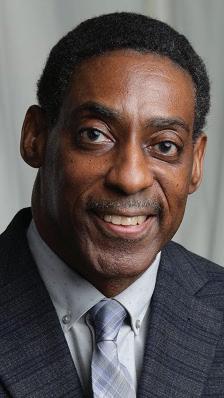
This was a reminder of how lynching is a dark part of our nation’s history that never totally went away. As an angry mob roamed through the Capitol, congressional staff, members of Congress and Vice President Pence were forced to shelter in place while basically being hunted down. A Confederate flag had never entered the U.S. Capitol during the Civil War; however, it was carried inside the building by the rioters on this sad day. Video footage showed rioters breaking windows and doors and ransack-
Lying is proving to be an effective political strategy for conservatives because so many people are willing to disbelieve
the facts and evidence while accepting untrue conspiracies, even when the truth and facts are crystal clear.
For example, the facts and evidence proved that while critical race theory analyzes how laws and policies perpetuate racial disparities and systemic racism in society, it was not taught in K-12 public schools as a formal curriculum. Yet conservative politicians and media figures used CRT as a rallying dog whistle to undermine efforts to address racism or promote equity. The furor over CRT was used as a symbol for broader grievances about changing social norms and racial justice.
“We’re saying, what is the fuss about?” said Lynn Daniel,
a ninth-grade English teacher in the Phoenix area. “We don’t get it. This objection is being pushed upon us, and it’s not even happening in our classes. I don’t understand it.”
Those on social media amplified the false narrative and misunderstandings to fuel the outcry that CRT is “indoctrinating children” and promoting antiwhite sentiment, even when mostAmericans, including educators, do not accurately understand what it is.
The term “woke” emerged as a call to remain vigilant, alert and conscious of racial injustice and social inequality. The antiwoke movement was a direct backlash to the racial justice activism that followed the George Floyd protests. The “antiwoke” rhetoric was used to reframe discussions on CRT and diversity, equity and inclusion as discriminatory, divisive and a threat to traditional values.
The negative impact from the anti-CRT, antiwoke and anti-DEI movement by ill-willed people became further entrenched when good-willed people of all races chose not to pay attention and stay informed of the truth. The racial backlash has consequences for people of color and their communities. Therefore, there needs to be a backlash to the backlash, where dissent and criticism are not silenced by denying individuals
Silencing journalists threatens freedom of all Americans
Stephen Colbert and Jimmy Kimmel — giants of late-night television — faced censorship, dismissal or forced silence when their words cross the powerful. That should alarm us all. If media figures of their stature can be muzzled, what chance do ordinary journalists or community truth-tellers have?
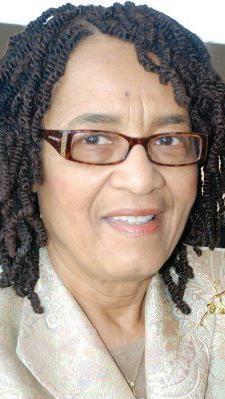
I know this pain personally. Decades ago, I was among the first Black women to sit on the editorial board of a major newspaper. I was eventually pushed out — not because of poor work, but because my views did not align with the white male owners. They praised the virtues of a free press while silencing those who tried to practice it.
The issue is not new. It is the age-old clash between voices that speak truth from the margins and systems that demand loyalty to privilege. When I wrote about poverty, inequality or the struggles of ordinary people, I was not being rebellious. I was testifying. But privilege prefers a flattering portrait over an honest mirror.
On many occasions, my white colleagues and I could be in the same room or looking at the same set of facts but walk away with conclusions as if we existed on different planets. For example, a popular U.S. senator once came to our editorial board meeting to boast about the massive cuts in health programs that would save taxpayers billions. But when I questioned how many children would be malnourished or sick because of the cuts, the reaction was almost like a pair of skunks had invaded the boardroom.
It was often painful to see
stories crucial to the health and welfare of people of color considered not news or heavily edited, which diluted their importance. For example, I investigated how Medicaid police destroyed the practices of African American doctors, leaving not only their patients medically neglected but also fracturing the livelihood
Barbara Reynolds
of the doctors. If this condition had not been centered in Black communities, it would have been front-page news. But pushing for coverage of these kinds of stories aided in my exit.
Not all of my time at the paper was negative, but it was frustrating that the opinions of the white writers sailed to the finish line while mine were circumspect, challenged and too often berated. The fight for equality in the newsroom for civil rights and liberties was often as challenging as the protests we covered outside. My honesty cost me my livelihood. My words were branded a “poison pen,” too inconvenient, too unwilling to play along. I wrote not to comfort the powerful but for the poor, the struggling and the left out — because I had once been there myself. That lived truth was not welcome in the boardroom. What was brushed aside as “minor” in my case is now playing out on a much larger and more dangerous scale. In-house censorship has metastasized, and it increasingly resembles the playbook of dictatorship.
President Donald Trump has made no secret of his disdain for independent media. He has pressured networks such as ABC and CBS to soften unfavorable coverage. He has filed defamation suits against The Wall Street
Journal and The New York Times. His allies in Congress stripped federal funding from NPR and PBS. The FCC, under his influence, has targeted diversity, equity and inclusion programs while vowing to root out what he calls “liberal bias.”
In a recent interview, Trump made his intentions clear: Networks, newspapers and talk show hosts that portray him unfavorably will be punished. That pressure is already reshaping major newsrooms once trusted to be fair.
Distinguished Black journalists, in particular, have been washed out. At The Washington Post, opinion columnist Karen Attiah was dismissed after she challenged right-wing commentator Charlie Kirk’s demeaning claim that Black women — including Michelle Obama and Justice Ketanji Brown Jackson — “lack brain processing power.”
The attack on the press goes further. The administration has imposed restrictions on journalists covering the Pentagon, requiring them to pledge not to report information unless it has been officially authorized. If such rules stand, they won’t stop at the Pentagon — they will spread across agencies, handcuffing reporters from doing the very job democracy depends on.
The silencing also highlights an opportunity to support the Black press, the hundreds of Black-owned newspapers as well as the podcasts and responsible social media that carry a variety of news. The silencing of “minor” voices decades ago prepared the ground for today’s assault on “major” ones. If we fail to resist now, the next silenced voice may not belong to a journalist or comedian — but to the people themselves.
The writer is an award-winning journalist, activist and educator.
their right to free speech. The same conservatives also forget that empathy, diversity, equity and inclusion are biblical principles of unity. While the Charlie Kirk murder has further divided the nation racially and politically, he did not deserve to be killed. As a Christian, his legacy does not totally reflect the character of Christ. Kirk once stated, “I can’t stand the word empathy. I think empathy is a made-up, new age term that — it does a lot of damage.”
Empathy is defined as “the ability to understand and share the feelings of another.” Wokeness is a form of empathy for the plight and suffering of others.
U.S. Rep. Bennie Thompson was chairman of the Jan. 6 House committee. He, in good conscience, could not vote in favor of the Charlie Kirk resolution. I agree with his sentiment and vote. The writer is the author of the book “God Bless Our Divided America.”
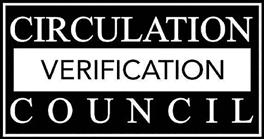



There’s a deep sense of despair settling over America. Families are working harder and falling further behind. The cost of raising children grows, while schools, housing and health care remain out of reach for too many. It’s no wonder people across this country — rural and urban, Black and white — feel left behind and politically homeless.

But our past offers a powerful, largely forgotten story of how people once came together — across race and class — to put their children first. It happened in post-Civil War Virginia, through a political force called the Readjuster Party. The Readjusters emerged in the late 1870s, when Virginia’s elites were insisting the state repay its massive prewar debt in
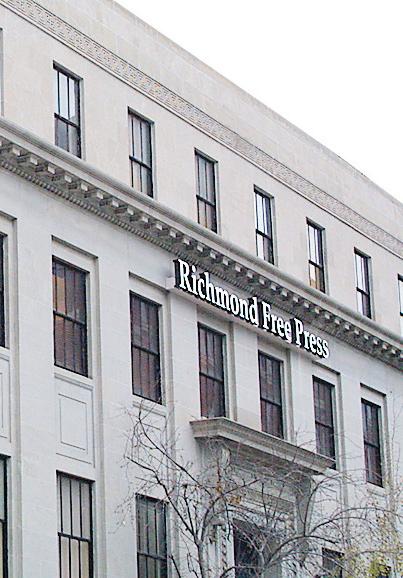
full — even if that meant closing schools and slashing public services. Poor and working-class families, Black and white, saw clearly what was at stake: the future of their children’s education. Public schools had been significantly expanded during Reconstruction, and they were now under threat. In response, Black voters and white working people —
Ben Jealous
farmers, laborers, veterans — formed the Readjuster coalition. Their message was simple but bold: Public debt should be “readjusted” so that education and opportunity for all children could come first. For a brief but impactful time in the 1880s, the Readjusters controlled Virginia’s state government. They raised public school funding, protected Black voting rights and pushed for reforms that served the working class, not just the
elite. It was one of the most successful examples of crossracial, working-class solidarity in American history.
One of the leaders of this movement was Edward David Bland, a Black Reconstructionera legislator from Petersburg. Elected to the Virginia House of Delegates in 1879, Bland was supported by both Black and white working-class voters — the kind of broad, grassroots coalition our politics rarely sees today. While in office, he championed public education and helped secure funding for Black schools and institutions. But his base was never just “the Black community” — it was the working people of Petersburg, Black and white alike, united by a shared demand for dignity and opportunity.
The Readjusters were eventually dismantled by a wellfunded and racially charged backlash that ushered in Jim Crow. But the impact of their brief victory endures. Virginia’s public school system — now
ranked among the strongest in the country — still benefits from the foundational reforms won by that movement.
Their story offers urgent lessons for today.
Too often, the struggles of poor white families are rendered invisible, while Black poverty is hypervisible but rarely treated with empathy. Both distortions serve to divide people who might otherwise stand together. In a political environment de-
signed to pit us against each other, the Readjusters remind us that it doesn’t have to be this way. We can choose something better.
We can build a politics rooted in our shared concern for our children. We can refuse to let race be used to divide the working class, as it so often is, and instead invest in a future where every child — rural or urban, Black or white — gets
a real chance at success. The Readjusters weren’t perfect, and they weren’t permanent. But they proved what’s possible when people stop fighting each other and start fighting for each other. If they could do it — in the shadow of the Civil War — then surely we can find the courage to do it again.
The writer is a professor of practice at the University of Pennsylvania.


NOTICE TO THE PUBLIC OF A PETITION OF VIRGINIA ELECTRIC AND POWER COMPANY FOR REVISION OF A RATE ADJUSTMENT CLAUSE, DESIGNATED RIDER DIST, UNDER § 56-585.1 A 6 OF THE CODE OF VIRGINIA AND THE CONSOLIDATION OF RIDERS DIST AND RBB PURSUANT TO § 56-585.1 A 7 OF THE CODE OF VIRGINIA CASE NO. PUR-2025-00136
On August 11, 2025, pursuant to § 56-585.1 A 6 (“Subsection A 6”) and § 56-585.1 A 7 (“Subsection A 7”) of the Code of Virginia, Virginia Electric and Power Company (“Dominion” or “Company”) filed with the State Corporation Commission (“Commission”) a petition (“Petition”):
(1) For revision of the rate adjustment clause (“RAC”) designated Rider DIST, pursuant to Subsection A 6, to recover the projected and actual costs related to certain electric distribution grid transformation projects that the Commission has approved as part of the Company’s plan to transform its electric distribution grid (“GT Plan”), to recover costs associated with the Company’s Strategic Underground Program (“SUP”), including incremental costs, and to recover costs associated with the Company’s Rural Broadband (“RBB”) projects (collectively, “Rider DIST Programs”) (“Request 1”);
(2) For approval to consolidate Riders DIST and RBB, pursuant to Subsection A 7, resulting in:
(i) the recovery of costs associated with the Rider DIST Programs through the Rider DIST RAC; and (ii) the withdrawal of Rider RBB, effective June 1, 2026 (“Request 2”);
(3) For approval of the incremental costs of Phase II Voltage Island Mitigation, fault, location, isolation, and service restoration (“FLISR”), and enterprise asset management system (“EAMS”) as reasonable and prudent (“Request 3”); and
(4) For approval of the rate year commencing June 1, 2026 through May 31, 2027 (“Rate Year”) (“Request 4”). Regarding the Company’s GT Plan, in Case Nos. PUR-2018-00100 and PUR-2019-00154, the Commission approved the Company’s investments related to eleven GT Projects for the years 2019, 2020, and 2021 (“Phase I”). In Case No. PUR-2021-00127, the Commission approved additional investments related to fourteen GT Projects for the years 2022 and 2023 (“Phase II”). In Case No. PUR2023-00051, the Commission approved costs associated with the continuation of twelve previously approved GT Projects and two new GT Projects for the years 2024, 2025, and 2026 (“Phase III”). In 2024, the Commission approved the new RAC designated Rider DIST and the consolidation of Riders GT and U in Case No. PUR-2024-00137 (“2024 Rider DIST Proceeding”). In the 2024 Rider DIST Proceeding, the Commission approved the Company’s proposed cost cap increase for Phase I physical security but denied the Company’s other nine cost cap increase requests without prejudice. With respect to Request 1 of the instant Petition, Dominion seeks cost recovery for a total of eighteen GT Projects across all three Phases, including: (1) Mainfeeder Hardening, (2) Targeted Corridor Improvement, (3) Voltage Island Mitigation, (4) Hosting Capacity Analysis, (5) the Locks Campus Microgrid, (6) Physical Security, (7) the Smart Charging Infrastructure Pilot Program, (8) Telecommunications, (9) Cyber Security, (10) Customer Education, (11) Intelligent Grid Devices, (12) FLISR, (13) Distributed Energy Resources Management System, (14) EAMS, (15) Voltage Optimization Enablement, (16) Substation Technology Deployment, (17) Outage Management System, and (18) the Non-Wires Alternatives Pilot Program. The Company represents that the Commission previously approved these Phase I, II, and III projects as reasonable and prudent up to the estimated capital and operations and maintenance costs for each project. The Company further represents that should costs exceed the cost caps, those costs would be incurred at the Company’s risk, and it would be the Company’s burden to demonstrate the reasonableness and prudence for any such incremental investment. Additionally, the Company notes that in the 2024 Rider DIST Proceeding, the Commission adopted the Chief Hearing Examiner’s recommendation that the Company be permitted to only seek recovery of incremental costs above the applicable cost cap upon completion of the relevant phase for the specific project.
Dominion provides an update on Phase VIII of its SUP, and states that it converted a total of 1,192 individual tap lines to underground, consisting of approximately 400.2 miles of underground conversions of overhead distribution tap lines and associated facilities. The Company states that it estimated a per-mile cost for Phase VIII of $734,547 per mile and the final per-mile cost was $795,490 per mile. The Company attributes this increase in cost to the overall rise in materials costs and associated overhead. It is the Company’s position that the cost per mile metric should be treated as a “statutory cost cap,” and, for any costs exceeding this threshold, the Company should be allowed to demonstrate that such costs are reasonable and prudent. Dominion requests that the Commission find that in light of unforeseeable supply chain disruptions and inflationary pressures, the incremental costs above the $750,000 per-mile metric associated with Phase VIII are reasonable and prudent.
The Company represents that proposed SUP Phase IX would include tap line conversions completed between June 1, 2025, and May 31, 2026, and would underground approximately 993 tap lines, equating to roughly 300.0 miles of outage prone overhead lines. The Company estimates Phase IX conversions would cost approximately $239 million, with an estimated per-mile cost of $798,015 and $10,042 per customer. The Company projects that the associated overhead lines directly serve 12,535 customers, with another 11,306 customers served “down line” from those conversions. The Company states that these tap lines have experienced approximately 4,629 outage events over a ten-year period, equating to 15.43 events per mile. The Company is requesting to recover costs for only those projects that would be completed prior to the beginning of the proposed Rate Year or June 1, 2026. The Company requests Commission approval of recovery of Phase IX capital investments through Rider DIST, subject to true-ups.
Regarding RBB, in its Petition the Company provides an update on previously-approved rural broadband projects and requests cost recovery for costs associated with these projects as part of Rider DIST and the elimination of Rider RBB. The Company asserts that as fiber capacity is installed as part of rural broadband projects, the Company will also have the ability to utilize broadband capacity for grid operational purposes. Given the dual capacity of fiber installed as part of the Rural Broadband Program, Dominion asserts that it is necessary to allocate costs between distribution grid operations and broadband utilization. The Company proposes continuing to use the methodology previously approved in Case No. PUR-2020-00197 to allocate costs between the rural broadband projects and approved GT Plan telecommunications projects. With respect to Request 2, Dominion seeks approval to consolidate Riders DIST and RBB, resulting in the recovery of the costs of the Rider DIST Programs through the revised Rider DIST RAC. Dominion also seeks approval of the withdrawal of Rider RBB, effective June 1, 2026. The Company states that the consolidation of Riders DIST and RBB is in the interest of judicial economy because the Company’s Rural Broadband projects have been operational for several years and the Commission currently reviews and approves such costs separately. The Company further states that consolidating the riders will reduce the administrative burden and costs of filing these cases separately With respect to Request 3, Dominion is seeking recovery of incremental costs
If the proposed Rider DIST revenue requirement for the Rate Year is approved, Dominion asserts that the typical residential customer’s monthly bill, using 1,000 kilowatt hours (“kWh”) per month, would increase by $1.09 compared to the combined impact of the current Rider DIST and Rider RBB. The Company represents that the total Rider DIST monthly bill impact would be $7.86, based on usage of 1,000 kWh per month. The Company proposes Rider DIST to be effective for usage on June 1, 2026, or the first day of the month that is at least 15 calendar days following the date of any Commission order approving Rider DIST for the Rate Year beginning June 1, 2026, through May 31, 2027.
Interested persons are encouraged to review Dominion’s Petition and supporting documents in full for additional details.
TAKE NOTICE that the Commission may apportion revenues among customer classes and/or design rates in a manner differing from that shown in the Petition and supporting documents and thus may adopt rates that differ from those appearing in the Company’s Petition and supporting documents.
The Commission entered an Order for Notice and Hearing in this proceeding that, among other things, scheduled a public hearing on Dominion’s Petition. A hearing for the receipt of testimony from public witnesses on the Company’s Petition shall be convened telephonically at 10 a.m. on February 10, 2026. On or before February 3, 2026, any person desiring to offer testimony as a public witness shall provide to the Commission: (a) your name, and (b) the telephone number that you wish the Commission to call during the hearing to receive your testimony. This information may be provided to the Commission: (i) by filling out a form on the Commission’s website at scc.virginia.gov/caseinformation/webcasting; or (ii) by calling (804) 371-9141. This public witness hearing will be webcast at: scc.virginia.gov/case-information/webcasting
Beginning at 10 a.m. on February 10, 2026, the Hearing Examiner appointed to this case will telephone sequentially each person who has signed up to testify as provided above.
On February 10, 2026, at 10 a.m., or at the conclusion of the public witness portion of the hearing, whichever is later, in the Commission’s second floor courtroom located in the Tyler Building, 1300 East Main Street, Richmond, Virginia 23219, the Hearing Examiner will convene the evidentiary portion of the hearing to receive testimony and evidence related to the Petition from the Company, any respondents, and the Commission’s Staff (“Staff”).
To promote administrative efficiency and timely service of filings upon participants, the Commission has directed the electronic filing of testimony and pleadings, unless they contain confidential information, and required electronic service on parties to this proceeding.
Electronic copies of the public version of the Petition may be obtained by submitting a written request to counsel for the Company: Jontille D. Ray, Esquire, McGuireWoods LLP, Gateway Plaza, 800 East Canal Street, Richmond, Virginia 23219, or jray@mcguirewoods.com. Interested persons also may download unofficial copies of the public version of the Petition and other documents filed in this case from the Commission’s website: scc.virginia.gov/case-information
On or before February 3, 2026, any interested person may submit comments on the Petition by following the instructions found on the Commission’s website: scc.virginia.gov/case-information/ submit-public-comments. Those unable, as a practical matter, to submit comments electronically may file such comments by U.S. mail to the Clerk of the State Corporation Commission, c/o Document Control Center, P.O. Box 2118, Richmond, Virginia 23218-2118. All such comments shall refer to Case No. PUR-2025-00136.
On or before November 3, 2025, any person or entity wishing to participate as a respondent in this proceeding may do so by filing a notice of participation at scc.virginia.gov/clk/efiling. Those unable, as a practical matter, to file a notice of participation electronically may file such notice by U.S. Mail to the Clerk of the Commission at the address listed above. Such notice of participation shall include the email addresses of such parties or their counsel, if available. The respondent simultaneously shall serve a copy of the notice of participation electronically on counsel to the Company, Staff, and any other respondents. Pursuant to 5 VAC 5-20-80 B, Participation as a respondent, of the Commission’s Rules of Practice and Procedure, 5 VAC 5-20-10 et seq. (“Rules of Practice”), any notice of participation shall set forth: (i) a precise statement of the interest of the respondent; (ii) a statement of the specific action sought to the extent then known; and (iii) the factual and legal basis for the action. Any organization, corporation, or government body participating as a respondent must be represented by counsel as required by 5 VAC 5-20-30, Counsel, of the Rules of Practice. All filings shall refer to Case No. PUR2025-00136. For additional information about participation as a respondent, any person or entity should obtain a copy of the Commission’s Order for Notice and Hearing.
On or before December 1, 2025, each respondent may file with the Clerk of the Commission at scc.virginia.gov/clk/efiling any testimony and exhibits by which the respondent expects to establish its case. Any respondent unable, as a practical matter, to file testimony and exhibits electronically may file such by U.S. mail to the Clerk of the Commission at the address listed above. Each witness’s testimony shall include a summary not to exceed one page. All testimony and exhibits shall be served electronically on Staff, the Company, and all other respondents simultaneous with their filing. In all filings, respondents shall comply with the Rules of Practice, as modified herein, including, but not limited to: 5 VAC 5-20-140, Filing and service, and 5 VAC 5-20-240, Prepared testimony and exhibits All filings shall refer to Case No. PUR-2025-00136.
Any documents filed in paper form with the Office of the Clerk of the Commission in this docket may use both sides of the paper. In all other respects, except as modified by the Commission’s Order for Notice and Hearing, all filings shall comply fully with the requirements of 5 VAC 5-20-150, Copies and format, of the Rules of Practice. The public version of the

Free Press staff report

Virginia Union University defeated Johnson C. Smith University 28-10 in the Willard Bailey Classic on Saturday at Hovey Field.
Senior running back Curtis Allen led the Panthers with 108 yards rushing and four touchdowns to earn Offensive Player of the Game honors. On defense, redshirt junior Zachary Weaver recorded a team-high seven tackles and was named Defensive Player of the Game.
“I’m extremely proud of the way our team competed tonight,” said VUU head football coach Alvin Parker. “This was a statement win for our program against a very good JCSU team. The home crowd brought tremendous energy, and our players really fed off that atmosphere.”
Despite a 90-minute weather delay, a crowd of 7,504 fans packed Hovey Field to witness the annual classic honoring legendary coach Willard Bailey.
The No. 25 Panthers struck early, with Allen scoring on a four-yard touchdown run just 17 seconds into the game. Brady Myers added the extra point for a 7-0 lead.
No. 21 Johnson C. Smith responded midway through the second quarter, tying the game 7-7 with a two-yard touchdown run by Kelvin Durham to cap a 55-yard drive.
Virginia Union answered quickly with Allen’s second touchdown, a six-yard run, to regain the lead 14-7.
Just before halftime, Johnson C. Smith trimmed the deficit with a 28-yard field goal by Lukasz Smolen, making it 14-10 at the break.
Allen scored his third touchdown of the game on a 12-yard
Free Press staff report
A new chapter in American football history began recently with the launch of the Hispanic Football Hall of Fame, an organization dedicated to recognizing Hispanic players, coaches and contributors at every level of the sport.
The Hall of Fame aims to celebrate the cultural and athletic impact of Hispanic people in football while inspiring the next generation of players and fans.
Two football legends, Ron Rivera and Anthony Muñoz, helped establish the HFHOF and serve as founding board members. Rivera, of Puerto Rican ancestry, is a Super Bowl champion as a player, a former NFL head coach and two-time NFL Coach of the Year. Muñoz, of Mexican ancestry, is a Pro Football Hall of Fame offensive lineman widely regarded as one of the greatest players in NFL history.
“Football has always been a sport that

Virginia Union running back Curtis Allen
28-10 in
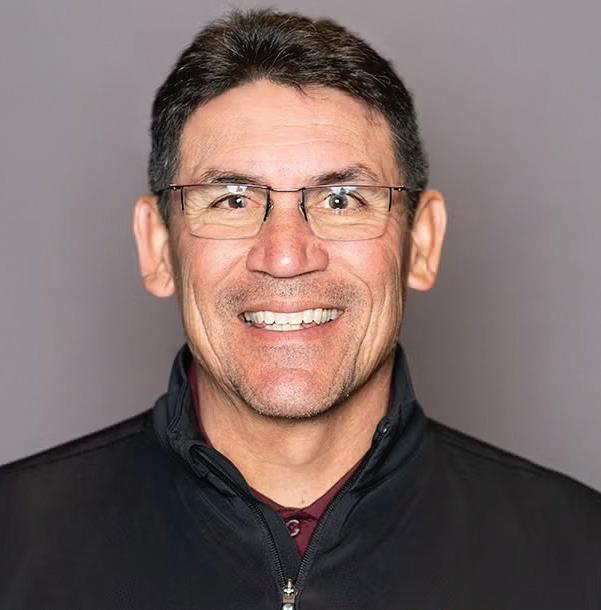
unites people from all backgrounds,” Rivera said. “The Hispanic Football Hall of Fame gives us an opportunity to tell the stories of incredible people who not only achieved greatness on the field, but also opened doors and inspired countless young people in our communities.”

Muñoz added, “This Hall of Fame is about more than honoring the past — it’s about building a future.”
The HFHOF, in partnership with the NFL, plans to host an International Flag Football Championship and football camps featuring top Hispanic high school players from around the world. NFL Executive Vice President of Football
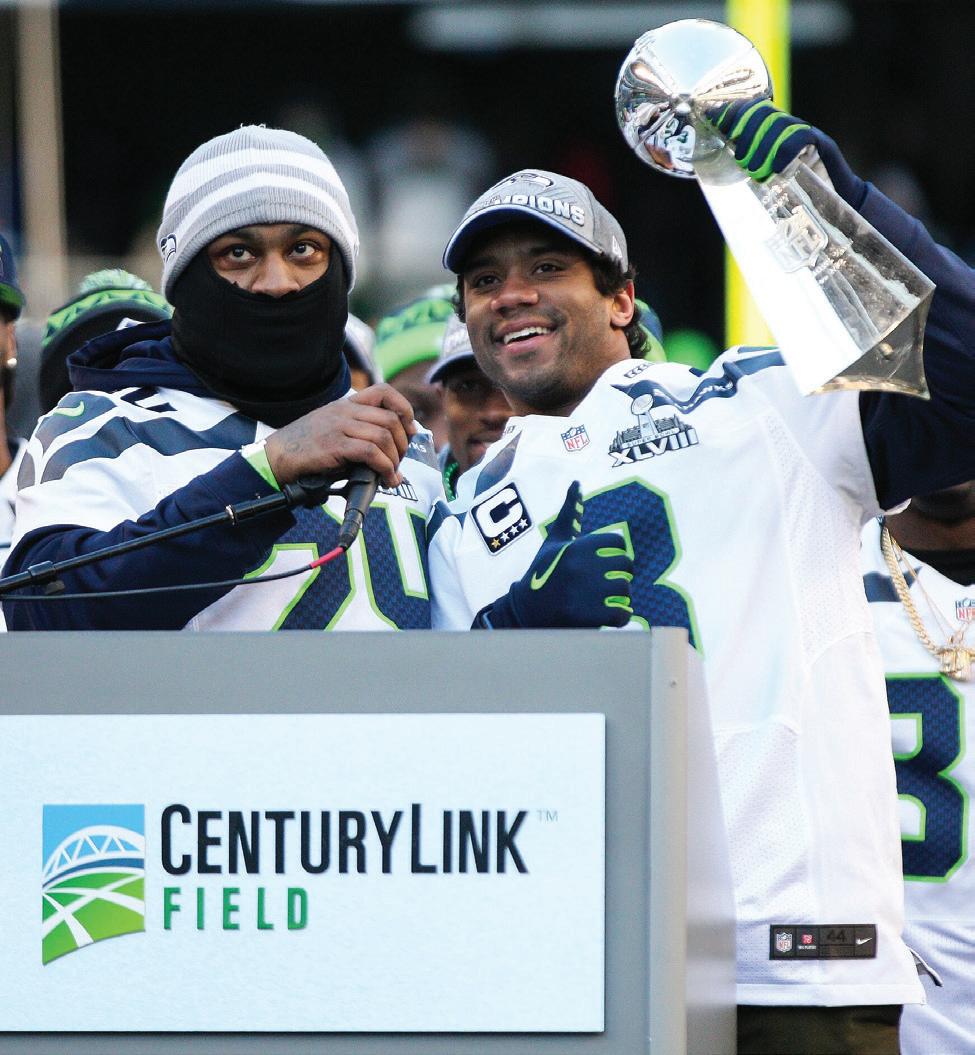
Free Press staff report
The National Black Players Coalition recently named New York Giants quarterback Russell Wilson its “Quarterback of the Century,” citing his career achievements on and off the field.
Wilson, who grew up in Richmond and attended Collegiate School, is entering his 14th NFL season and is the first Black quarterback in the 100-year history of the Giants to start a season opener. He has recorded more than 46,000 passing yards and over 5,400 rushing yards, making him one of the most productive dualthreat quarterbacks in NFL history. He holds the record for the most wins by a quarterback in their first nine seasons and is
Free Press staff report
Jackson State held onto the top spot in the BOXTOROW HBCU Football Media Poll for the fourth week of the 2025 season.
The Tigers (2-1) earned 23 first-place votes and 239 total points from the panel of media members nationwide. South Carolina State stayed at No. 2, while Alabama State remained third with one first-place vote. North Carolina Central and Alabama A&M rounded out the top five. Grambling and Prairie View A&M were new to the top 10 this week at Nos. 9 and 10.

The BOXTOROW HBCU Football Media Poll is voted on by media members who cover HBCU football across the country. Annual infield dinner will return to The Diamond Panthers roll past Johnson C. Smith 28-10
Free Press staff report
The Richmond Flying Squirrels will host the fourth annual “Dinner on the Infield” presented by West Broad Honda at The Diamond on Friday, Oct. 3, with proceeds benefiting Flying Squirrels Charities. The Oktoberfest-themed event runs from 6:30 to 10 p.m. on the stadium’s infield and will feature Bavarian cuisine, seasonal beers, live music, games and more. Vegetarian options will be available.
Activities will include an open bar, a stein-
holding contest, a dance floor, raffles and silent auctions. The Low‘n’Brows German Band will perform, and fans are encouraged to wear Oktoberfest attire such as lederhosen. High heels are not permitted on the field, but wedges are allowed.
Tickets are $75 each or $125 for two and can be purchased online, by phone at (804) 359-3866 or in person at the Flying Squirrels’ offices at The Diamond.
Proceeds support Flying Squirrels Charities, which provides Richmond youth with access to athletic and educational opportunities.

Operations Troy Vincent, a member of the HFHOF International Advisory Committee, called the initiative
“a promise of hope for future generations.”
“The Hispanic Football Hall of Fame reaches far beyond recognizing the accomplishments of Hispanic athletes, coaches and leaders,” Vincent said. “By honoring the pioneers and elevating the voices of Hispanic players, coaches and leaders, we strengthen the game and inspire young people to see football as a place where they belong, where their heritage is valued and where their dreams can thrive.”
The HFHOF will spotlight trailblazing play-
the only quarterback with nine consecutive winning seasons.
Drafted by the Seattle Seahawks in 2012 as the 75th overall pick, Wilson led Seattle to back-to-back Super Bowl appearances in 2014 and 2015, winning Super Bowl XLVIII with a 43-8 victory over the Denver Broncos. He has also guided his teams to multiple playoff victories, including several come-from-behind wins.
In college, Wilson set NCAA records for most consecutive passes without an interception (379) and the highest singleseason passing efficiency rating (191.8). He was named to the NFL All-Rookie Team and earned Rookie of the Year honors.
Off the field, Wilson and his wife, singer Ciara, are involved in charitable work through the
ers and coaches from past and present through exhibits, events and educational programs. Its inaugural “Celebración de Fútbol” Induction Ceremony is scheduled for spring 2026, launching an annual tradition to honor Hispanic contributions to football.
Inductees, along with Pro, College, and High School Player of the Year award winners, will be selected by a committee of journalists and broadcasters chaired by Sandy Núñez, NFL Network vice president and HFHOF board member. Other committee members include Judy Battista, Rolando Cantú, Paul Gutierrez, Brandon Huffman, Moisés Linares, Alex Marvez, Armando Salguero and John Sutcliffe.
The Hispanic Football Hall of Fame is a 501(c) (3) nonprofit organization founded in 2025. Its board includes Rivera, Muñoz, Núñez, David Ortega, Gary Acosta, Xavier A. Gutierrez and Max Montoya. More information is available atHispanicFootball.org
Why Not You Foundation, which focuses on education, children’s health, poverty relief and youth football programs. Wilson has donated to organizations including Feeding America and the Boys & Girls Clubs and has received the Walter Payton NFL Man of the Year Award and the Bart Starr Award.
Wilson’s career has been compared to the legacy of earlier Black quarterbacks such as Fritz Pollard, George Taliaferro, Marlin Briscoe, James Harris, Doug Williams, Warren Moon, Randall Cunningham, Donovan McNabb and Steve McNair.
Eagles quarterback Jalen Hurts said Wilson “paved the way for a ton of guys, including myself,” reflecting the influence Wilson has had on the next generation of Black quarterbacks.

Free Press staff report
Virginia Union’s Abijah Jepkemboi turned in a commanding performance Friday to win the women’s race at the Blue Bear Cross Country Invitational hosted by Livingstone College. Jepkemboi covered the 4.5-kilometer course in 17 minutes, 32.54 seconds, finishing 15 seconds ahead of the runner-up to capture the individual title. Her victory anchored a strong showing for the Lady Panthers, who finished second overall among six teams. Natalie Young took third in 17:54.76, while Toni Middlebrooks came in fifth in 19:05.98 to round out Virginia Union’s top finishers. “The women’s team finished second overall, led by Abijah Jepkemboi in first place, Natalie Young in third and Toni Middlebrooks in fifth,” head crosscountry coach Franck Charles said. “They set a strong standard for our ladies. This meet was about building self-confidence and proving that even when the window may seem closed, with faith and a strong heart there’s always a positive outcome.” The Lady Panthers’ performance marked their best finish of the season and underscored the depth of their roster early in the fall schedule. Virginia Union will next compete Oct. 3 at 4:30 p.m. at the Ben Snelling Cancer Classic in Louisburg, N.C.
Before his role in “Amistad,” the 1997 film about a 19th-century revolt by enslaved Africans on a Spanish ship, Djimon Hounsou, a native of Benin in West Africa, had limited knowledge of slavery — including his own country’s involvement. This realization sparked a journey of discovery, leading him to explore the history of the transatlantic slave trade.
“Europe and the U.S. made me aware of the diaspora,” Hounsou said, noting that he and many Africans often don’t learn the full scope of the transatlantic slave trade or its impact on African Americans. “We have been divided, and we don’t feel a connection, but I believe the awareness is slowly coming.”
The two-time Academy Award nominee is known for his notable roles in films such as “Gladiator” and “Blood Diamond.” He lends his star power to the Djimon Hounsou Foundation, a nonprofit he founded in 2019.
“I have had the fortune of making films that have some social impact,” he said. “During this time of social challenge and change that we’re going through, it helps to know our history. We need to learn from it and reflect on where we’ve been and where we’re headed.” Through his foundation, Hounsou aims to connect the African diaspora with the motherland while celebrating the unity and diversity of Black people. The foundation will host “Run Richmond 16.19,” a cultural and historical event, on Saturday, Sept. 27. Now in its fourth year, the run/walk, held in collaboration with the Black History Museum & Cultural Center of Virginia, invites participants to experience 400 years of Black history.
“Richmond is the cradle of American history. It’s also a beautiful place, and it deserves to be celebrated,” he said.
Hounsou, as part of his foundation’s work, is pushing back against the erasure of Black history at a time when anti-diversity movements are gaining ground.
“We don’t have to wait for governments,” he said. “We can do it ourselves — layering people together, making people stronger, not pitted against one another.”
Soft-spoken and deliberate, Hounsou carries himself with humility shaped by his upbringing in Benin. He says he values respect above all and remains focused on honoring ancestors who paved the way.
“We cannot undo the horrors of the slave trade,” Hounsou said. “The question is how to turn something so horrible into something powerful.”
Where were you born?
In Cotonou, Benin.
What was it like growing up in Benin?
I didn’t face many challenges growing up in Benin. I was too young, but there was a European indoctrination. The country remains under French influence, with strong political, military and economic ties to France.
Where do you live now?
Between L.A. and Atlanta.
Tell me about your family.
I have three kids: a teenager, a 3-year-old and a 2-year-old.
What is the Djimon Hounsou Foundation?
The Djimon Hounsou Foundation (DHF) is a nonprofit organization seeking to strengthen African identity and awareness, combat modern-day slavery and human trafficking, and reconnect the African diaspora with the culture and roots of
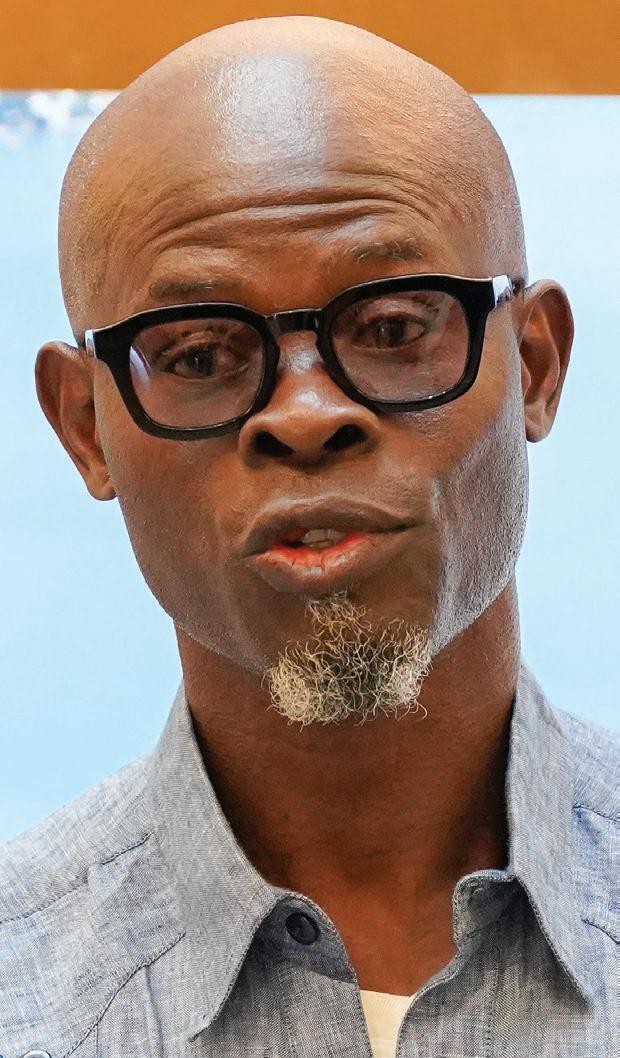
the motherland.
When did you start the foundation?
Dec. 2, 2019, which marks the “International Day for the Abolition of Slavery.” I announced its formation at the United Nations Headquarters in New York City in the presence of the Congressional Black Caucus.
What is its mission?
Our mission is two-fold: To strengthen Africa’s intergenerational identity and selfawareness by reconnecting the peoples of the African Diaspora with their motherland and celebrating “Unity in Diversity.”
What is Run Richmond 16.19?
It’s a cultural run or walk event in collaboration with the Black History Museum & Cultural Center of Virginia, taking place on Saturday, Sept. 27. Runners and walkers can choose between a 16.19K run (10 miles) and a 6.19K run/walk (3.85 miles) and will encounter engaging history signs along the
way. The numbers 16.19 represent the year 1619, when the first enslaved Africans arrived in the English colonies, marking the beginning of a dark chapter in American history. It’s our fourth year, and we’re expecting about 2,500 participants.
Can you describe the disconnect you’ve observed between Africans and the African diaspora?
The lineage that connects us is misunderstood. I saw it when I came to America in the 1980s. I didn’t speak much English, but it was more than a language barrier. I experienced a lack of knowledge and understanding between Africans and African Americans. For example, I only learned about African American history when I did the movie “Amistad.” I didn’t know my country’s role in the slave trade. Now, I feel the history in my identity.
What does success for the foundation look like?
The success of the foundation means reconciliation, remembrance and healing the intergenerational trauma the African diaspora faces as a result of the slave trade. It means that we address it in a meaningful way. It means we see, feel and touch the history. It’s the history of white people, too.
What are some of DHF’s programs and initiatives?
We have four distinct strategic programs: Our Africa RECONNECT Series aims to symbolically reverse the direction of the slave trade and celebrate homecoming. We organize free cultural trips to West Africa. We’re building a Pan-African activist network and combating modern-day slavery.
Who are the Run Richmond 16.19 partners?
Our partners include the Black History Museum & Cultural Center of Virginia, Sports Backers, Allianz Partners, the Elegba Folklore Society, Drums No Guns, Community Healing Network, Lessons in Emotional Healing and Freedom, and The Well Collective, along with over 40 community organizations and businesses that contribute to the event’s community focus.
How do you start your day?
I drink a large cup of hot water with lemon.
Who is your dream dinner party guest?
Marcus Garvey or the former Ghanaian president Nana Addo Dankwa Akufo-Addo, who launched the “Year of the Return” initiative in 2019, inviting the global diaspora to visit Ghana.
What are the three words that best describe you?
Dedicated. Dreamer. Humanitarian.
What is a quote that inspires you?
My mother used to tell me, “If you leave your house and you lose track of where you’re headed, at least remember where you come from.” Who has had the most influence in your life?
My mother, who encouraged me to leave Benin, and my older brother, who made it possible for me to attend school in France.
What is next for you?
I will begin filming a trafficking thriller called “Red Card,” set in Kenya’s Maasai Mara and the Moroccan port city of Casablanca, with Halle Berry in October. It is expected to be released in late 2026.
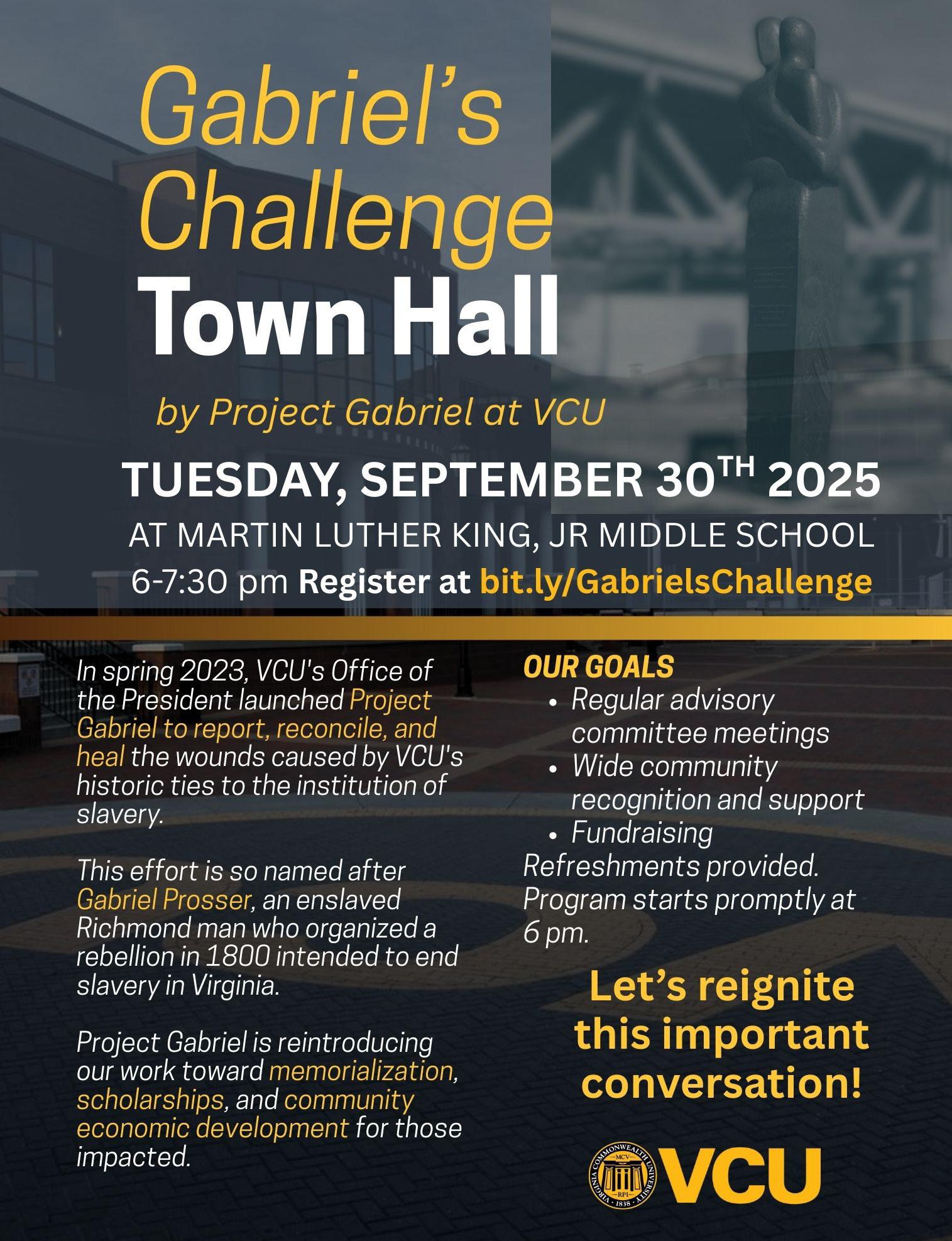
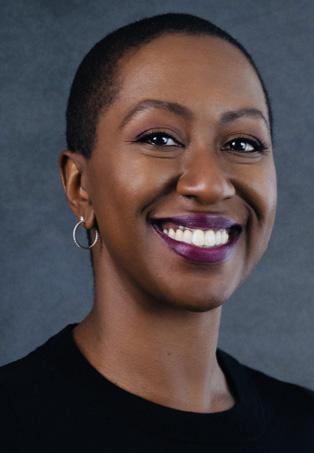


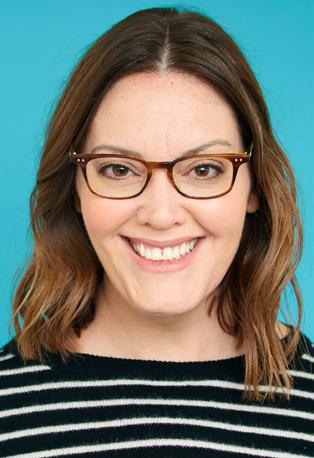

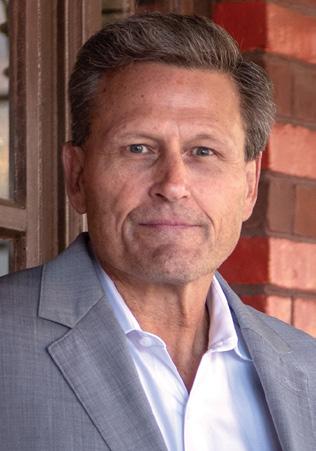


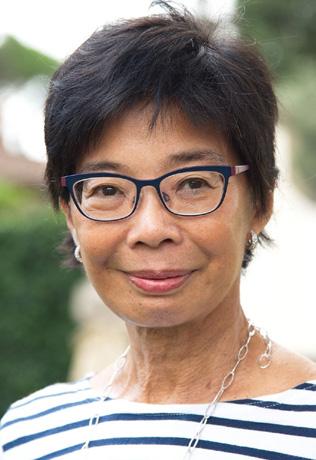

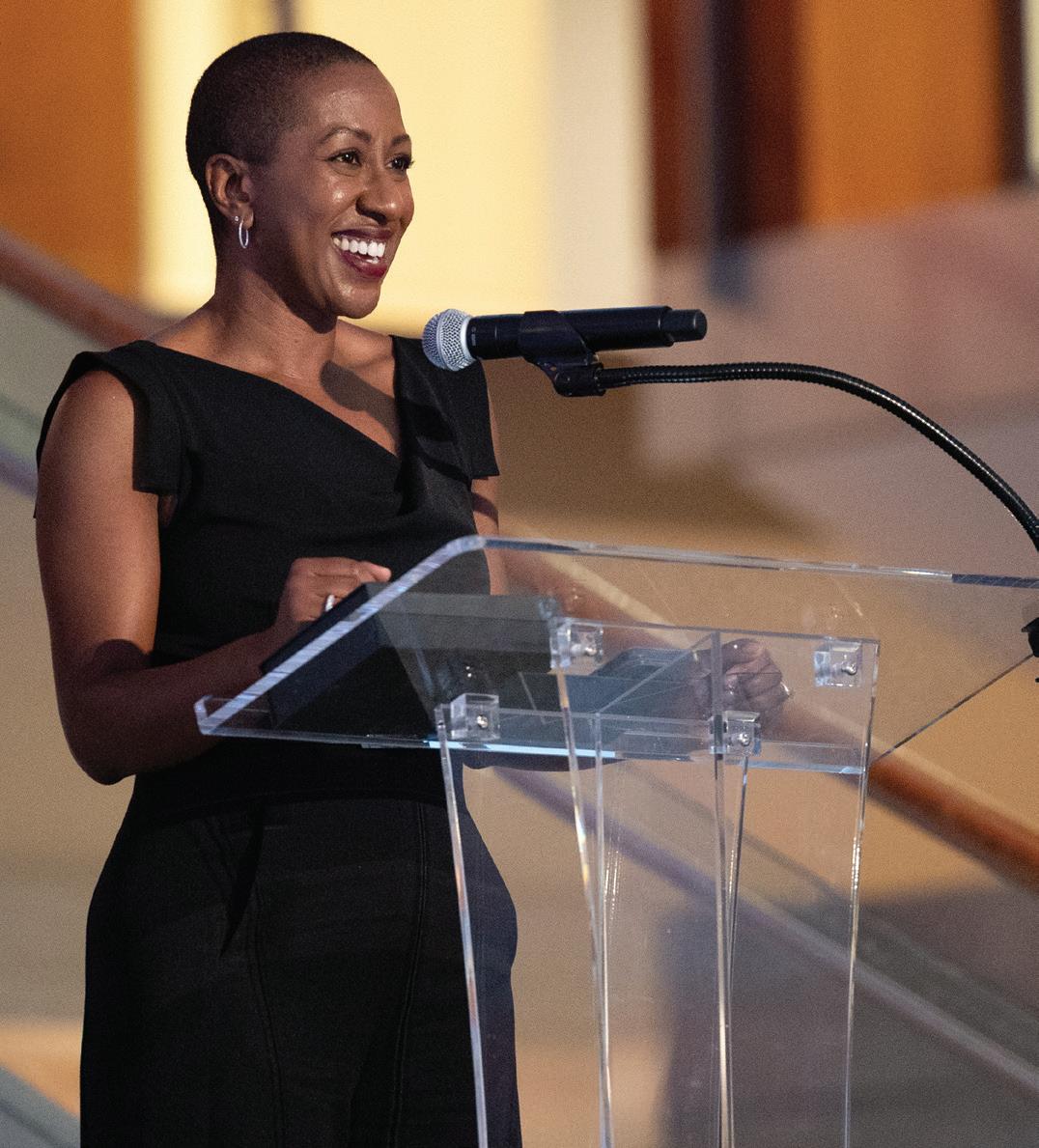
Photo courtesy of Library of Virginia
Justene Hill Edwards, winner of the 2025 Virginia Literary Award for nonfiction, speaks to the audience during the 28th annual awards at the Library of Virginia on Sept. 20. Her book,
and Trust: The Rise and Betrayal of the Freedman’s Bank,” has received critical acclaim for its scholarship and insight.
Free Press staff report
Richmond will celebrate its homegrown musical talent at the RVA East End Festival on Saturday, Sept. 27 from noon to 7 p.m. at Martin Luther King Jr. Middle School.
The festival highlights musicians who began their careers in Richmond and have since gained regional and national recognition. Featured performers include Grammy-nominated guitarist and singer Lenny Holmes; jazz saxophonist James “Saxsmo” Gates, who released his latest album, “Saxmo’s Den,” in July; cover band Dap Mallory Band; singer-songwriter Corey El; and the Richmond Symphony.
The event opens with the Richmond Police Community Band and the national anthem performed by Destin Scott, a student at Franklin Military Academy. Students from Richmond Public Schools’ East End will also perform.
City Council President Cynthia Newbille, representing Richmond’s 7th District, said the festival provides inspiration for young people.
“We want the young people of the East End to look at all of these successful musicians and say ‘I can do that, too!’ The RVA East End Festival offers them a clear line of sight and a pathway to the future.”
Admission is free, but donations are encouraged to support music and arts programs in East End schools. The festival will also feature food vendors, exhibit booths and a children’s play area.
Since 2016, the festival has raised more than $550,000 for arts programs in RPS’ East End communities. For more information, visit the festival’s Facebook page.
Free Press staff report
Due to popular demand, the Virginia Museum of Fine Arts will offer extended hours for the exhibition “Frida: Beyond the Myth” during its final five days, Wednesday, Sept. 24 through Sunday, Sept. 28. The exhibit at the museum at 200 N. Arthur Ashe Blvd. highlights the life and work of 20th-century Mexican artist Frida Kahlo, whose arresting gaze, signature fashion and trailblazing legacy continue to captivate audiences. “Frida: Beyond the Myth” features more than 60 paintings, drawings, prints and photographs, including self-
portraits, still lifes and imaginative compositions spanning her career from 1926 until her death in 1954. Many works are rarely seen outside Mexico.
Pictures of Kahlo taken by photographers including Lola Álvarez Bravo, Imogen Cunningham, Julien Levy, Dora Maar and Nickolas Muray are also part of the exhibition. Visitors can explore how Kahlo used art to transcend physical pain and disability, express gender fluidity and celebrate her Mexican identity while continually reinventing herself through iconic self-portraits. The VMFA is the exhibition’s only East Coast venue and one of only two venues nationwide.
During the extended hours, “Frida: Beyond the Myth” and the VMFA Shop will be open from 9 a.m. to 9 p.m. Best Café will be open from 10 a.m. to 9 p.m., and Amuse Restaurant will operate from 11:30 a.m. to 9 p.m., with last seating at 8 p.m. The museum’s permanent collection galleries will remain open only during regular hours. Tickets are available at vmfa. museum.
Seven authors received the Library of Virginia’s 28th annual Virginia Literary Awards on Friday at the state library’s annual dinner and gala.
New York Times bestselling author and filmmaker Adriana Trigiani hosted the Sept. 20 celebration, which drew more than 250 attendees. The event also honored acclaimed musician Damien Geter with an honorary Patron of Letters degree for his fusion of classical music and Black diaspora influences in works promoting social justice.
“Each year, we look forward to celebrating the voices that have left lasting impacts on Virginia’s literary and cultural communities,” said Dennis T. Clark, Librarian of Virginia. “This celebration not only honors outstanding achievements, but also supports our ongoing commitment to offering vital archival resources and enriching programs that serve communities across the Commonwealth.”
The nonfiction award went to Justene Hill Edwards for “Savings and Trust: The Rise and Betrayal of the Freedman’s Bank.” An associate professor of history at the University of Virginia, Edwards also authored “Unfree Markets: The Slaves’ Economy and the Rise of Capitalism in South Carolina” and has won numerous
fellowships, including an Andrew Carnegie Fellowship and a Mellon New Directions Fellowship.
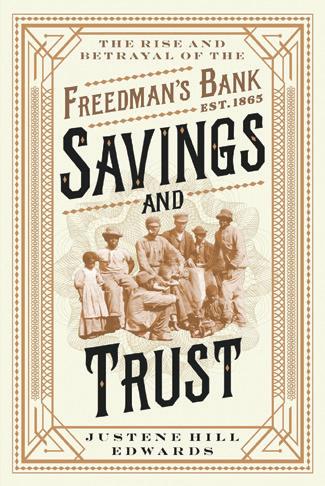
For fiction, Isabel Banta earned recognition for her debut novel, “Honey.” The Brooklyn-based writer, book publicist and indie bookseller graduated from U.Va. “An Authentic Life” by Jennifer Chang took the poetry award. The book was also a finalist for the Pulitzer Prize and the National Book Critics Circle Award. Chang serves as poetry editor of New England Review and teaches at the Bennington Writing Seminars and the University of Texas in Austin.
In children’s literature, Carter Higgins won for “Round and Round the Year We Go.” An Emmy Award-winning visual effects artist who spent a decade as a school librarian, Higgins has authored numerous books for young readers, including “Everything You Need for a Treehouse” and “Some of These Are Snails.”
For the People’s Choice awards, Evan Friss received recognition for his nonfiction work “The Bookshop: A History of the American Bookstore,” and David Baldacci
won for his novel “A Calamity of Souls.” Friss, a history professor at James Madison University, wrote the New York Times bestseller that Time magazine named one of its 100 Must-Read Books of 2024. Baldacci, a lifelong Virginian who has published 49 novels for adults, received bachelor’s and law degrees from Virginia Commonwealth University and U.Va., respectively.
The Art in Literature: The Mary Lynn Kotz Award went to Deborah Parker for “Becoming Belle da Costa Greene: A Visionary Librarian Through Her Letters.” Parker is Professor Emerita of Italian at U.Va.
Geter, the Patron of Letters degree recipient, owns DG Music and Sans Fear Publishing and serves as interim music director and artistic advisor at Portland Opera. He is also the Richmond Symphony’s composer-in-residence through 2026. His new opera “Loving v. Virginia,” based on the landmark Supreme Court case that struck down laws banning interracial marriage, premiered in May as the conclusion of Virginia Opera’s 50th anniversary season.
The gala raised funds for the Library of Virginia’s conservation, education and community outreach initiatives. Each literary award winner received a crystal book award and monetary prize.

It wasn’t quite October, but Richmonders came out to the Museum District on Friday, Sept. 19, for the 20th annual St. Benedict’s Oktoberfest. The three-day festival features live music and dancing, a Christkindlmarkt, children’s activities, German food and beers from Germany and local breweries.



Free Press staff report
A state historical marker will be dedicated next month in Westmoreland County to commemorate a late 19th-century federal court case that helped lay the groundwork for one of the country’s earliest civil rights organizations.
The Stewart Sisters v. The Steamer Sue case involved Westmoreland natives Martha and Winnie Stewart, Mary Johnson and Lucy Jones, who in 1884 were denied first-class accommodations on the Steamer Sue while traveling from Baltimore to visit family in Kinsale because of their race. With support from their pastor, the Rev. Harvey Johnson
of Baltimore’s Union Baptist Church, the women sued the Baltimore, Chesapeake, and Richmond Steamship Company, arguing that segregated quarters were illegal and unequal.
The trial court ruled that segregation was reasonable but awarded each woman $100 because the accommodations were unequal.
The federal appeals court upheld the ruling.
The case became a catalyst for the creation of the Mutual United Brotherhood of Liberty, a precursor to the NAACP.
The dedication ceremony is set for Saturday, Oct. 4 at noon at New Jerusalem Baptist Church, 2695 Kings Mill Road, Kinsale. The marker will be unveiled a few yards east of 13890 Cople Highway on Route 202.

Virginia Tech associate professor Dennis Patrick Halpin, author of “A Brotherhood of Liberty: Black Reconstruction and Its Legacies in Baltimore, 1865-1920,” will provide a historical overview. Stewart descendants Dallas Henderson and Clint Thomas are also scheduled to speak, and Fannie Thomas, the only surviving grandchild of the Stewart sisters, will lead the unveiling with other descendants. A reception will follow at New Jerusalem Baptist Church.
The Virginia Board of Historic Resources approved the marker in September 2024. The Middle Peninsula African-American Genealogical and Historical Society sponsored its creation.

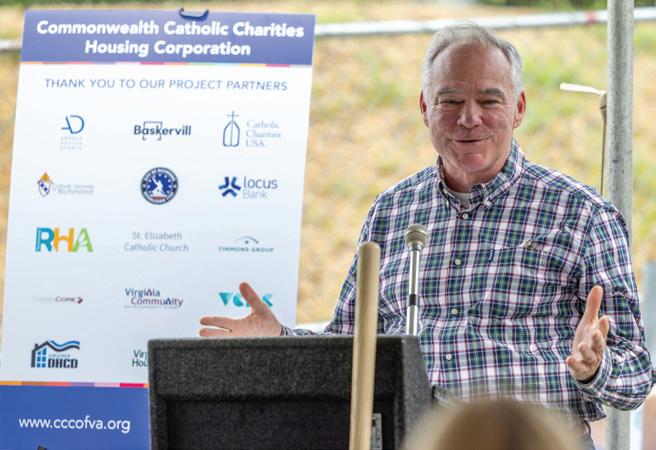
Plans for a new affordable housing complex in Richmond — years in the making — are now taking shape. The development, first proposed in 2019, will feature 56 rental homes spread across 14 buildings on a three-acre site. Designed for families earning 40% to 60% of the area median income, the complex will offer studio, one-, two- and three-bedroom apartments. A tree-lined driveway, community playground and walking trail to a nearby elementary school are included in the design.
CCC will also provide support for residents, including rent and utility assistance, financial counseling and access to food and nutritional programs. The property, once home to Saint Elizabeth
Lift Your Gift gospel fest to celebrate faith, music and fellowship day of worship and food, fun times!” said Kelly P. Lee, gospel fest coordinator. “This event is about more than just music — it’s about spreading hope, love and faith while strengthening our community.”
Free Press staff report
The Lift Your Gift gospel fest will bring faith, music and fellowship to Petersburg on Saturday, Oct. 11. The event will run from 2 to 4:30 p.m. at Metropolitan Baptist Church, 1021 Halifax St.
The festival will feature gospel artists, community choirs, praise teams, musicians and Christian performers, including Antuan Barnes, Liberation RVA Mass Choir, Virginia Union University Gospel Choir, Breathe Dance Studio, Tim Mallory II and Leviticus Choir, Gayle Jones-Foster, Christal Bacon and the Virginia State University Gospel Chorale.
Attendees can also enjoy games with prizes, the Traditionz food truck and smallbusiness vendors selling local goods.
“We are thrilled to bring the community together for a
According to a news release, the Lift Your Gift gospel fest is designed to encourage, empower and strengthen the community by celebrating Christian gifts publicly through music, dance, poetry and worship.
Tickets are $15 and must be purchased online through Eventbrite or CashApp ($LiftYourGift25). No cash payments will be accepted at the event. For more information, contact Lee at Liftyourgift@gmail.com.




Roman Catholic Church, was donated in 1923 and sat vacant after the 1980s. It is now being leased to the project by the Richmond Catholic Diocese under a 99-year ground


